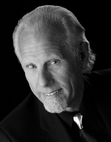Paul Bishop's Blog, page 26
May 20, 2017
KICKIN' THE WILLY BOBO WITH ~ JAMES HOPWOOD
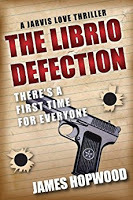
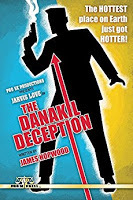
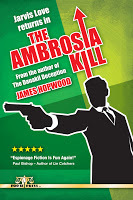
KICKIN' THE WILLY BOBO WITH ~ JAMES HOPWOOD Over a his Blood and Ink blog, my buddy and Fight Card alum Derrick Ferguson recently interviewed my good friend from down under, Fight Card mainstay David Foster (aka: James Hopwood) about a new anthology in which he appears, Hollywood Murder. Derrick was kind enough to let me reprint their interview here...So, for this post, I’m turning Bish’s Beat over to Derrick to kick the Willy Bobo (don’t ask) around with David Foster/James Hopwood...********DERRICK FERGUSON: Who is James Hopwood?
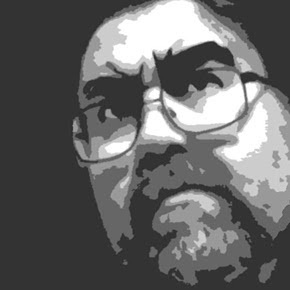 DAVID FOSTER: James Hopwood is my pen name. I have also been Jack Tunney three times. But in the real world I am David James Foster. I assumed a pen name to separate myself from three successful artists, albeit in different disciplines, who have published under the name David Foster. Firstly there is an excellent award winning Australian author; then a world champion woodchopper; and finally a successful musician and music producer. Then there's David Foster Wallace, of course. Adding another David Foster to the marketplace, would not only detract from their achievements—as well as my own—but would create confusion for the reading public. Where do you live and what do you do to keep the bill collectors, away? I live in Melbourne, Australia, in a little seaside suburb called Seaford. Near the pier that featured in the original Mad Max with Mel Gibson. Yeah, those bill collectors, can't outrun those guys. I mainly work in graphic design and typesetting—small scale stuff, my illustration skills aren't too crash hot these days. But I get by, no complaints. Tell us something about your background.
DAVID FOSTER: James Hopwood is my pen name. I have also been Jack Tunney three times. But in the real world I am David James Foster. I assumed a pen name to separate myself from three successful artists, albeit in different disciplines, who have published under the name David Foster. Firstly there is an excellent award winning Australian author; then a world champion woodchopper; and finally a successful musician and music producer. Then there's David Foster Wallace, of course. Adding another David Foster to the marketplace, would not only detract from their achievements—as well as my own—but would create confusion for the reading public. Where do you live and what do you do to keep the bill collectors, away? I live in Melbourne, Australia, in a little seaside suburb called Seaford. Near the pier that featured in the original Mad Max with Mel Gibson. Yeah, those bill collectors, can't outrun those guys. I mainly work in graphic design and typesetting—small scale stuff, my illustration skills aren't too crash hot these days. But I get by, no complaints. Tell us something about your background.
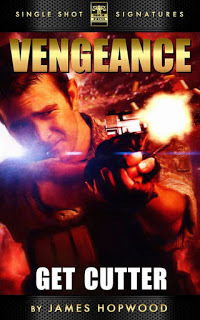 I grew up in rural Australia, about 2.5 hours north of Melbourne on the Murray River. It was a small town called Echuca. They filmed a TV mini—series there in the early 80s called All The Rivers Run, which starred Sigrid Thornton and John Waters. I only mention it, because those who've seen it will have a pretty good idea about my old home town. I got out of there pretty early though, in my late teens, to study art and design. Finally made my way to the big smoke, and have lived here ever since. How long have you been writing? I guess I've toyed around with writing since I was in my twenties, but I was one of those guys who kept it all hidden away in a bottom drawer. But the internet changed all that. I corresponded with like—minded people from all around the globe, people who were into the same kind of books and stories as I was, and I thought if they're giving it a go, then I should too. Five years ago, I broke the shackles when I penned a novella for the Fight Card series, called King Of The Outback. The reaction to it was pretty positive, which gave me the confidence to keep going.
I grew up in rural Australia, about 2.5 hours north of Melbourne on the Murray River. It was a small town called Echuca. They filmed a TV mini—series there in the early 80s called All The Rivers Run, which starred Sigrid Thornton and John Waters. I only mention it, because those who've seen it will have a pretty good idea about my old home town. I got out of there pretty early though, in my late teens, to study art and design. Finally made my way to the big smoke, and have lived here ever since. How long have you been writing? I guess I've toyed around with writing since I was in my twenties, but I was one of those guys who kept it all hidden away in a bottom drawer. But the internet changed all that. I corresponded with like—minded people from all around the globe, people who were into the same kind of books and stories as I was, and I thought if they're giving it a go, then I should too. Five years ago, I broke the shackles when I penned a novella for the Fight Card series, called King Of The Outback. The reaction to it was pretty positive, which gave me the confidence to keep going.
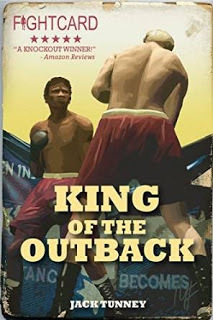 What's your philosophy of writing? I'm pretty loose with my approach, and I keep changing to suit my circumstances. I write pretty much every day because I enjoy it, but I am not too concerned if I miss a day or even a week. The thing for me is to be at least thinking about my work, and how I will use the time when I do get in front of a computer. I hate sitting in front of a blank screen waiting for inspiration to strike. I am also a big believer in research. Like any writer, I hit road—blocks and snags along the way. But I have found the harder I work researching, the more likely I am to find that nugget that will get the story back on course. That's not to say my stories are based on fact, or some kind of concrete truth, but it's from there I find ideas spring forth.
What's your philosophy of writing? I'm pretty loose with my approach, and I keep changing to suit my circumstances. I write pretty much every day because I enjoy it, but I am not too concerned if I miss a day or even a week. The thing for me is to be at least thinking about my work, and how I will use the time when I do get in front of a computer. I hate sitting in front of a blank screen waiting for inspiration to strike. I am also a big believer in research. Like any writer, I hit road—blocks and snags along the way. But I have found the harder I work researching, the more likely I am to find that nugget that will get the story back on course. That's not to say my stories are based on fact, or some kind of concrete truth, but it's from there I find ideas spring forth.
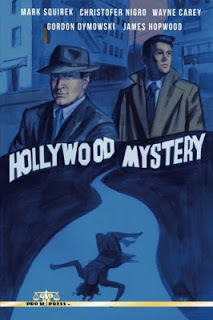 How did you get involved with Hollywood Mystery? Whose idea was it? Pro Se Productions put out an open call a couple of years ago for the anthology, and at the time I was tied up with a few other projects, so I reluctantly let it slide. However, when my schedule opened up, I was surprised to find there were still a spot open and decided to pounce. My idea was for a Thin Man type of story, featuring William Powell and Myrna Loy. I presented a proposal for a 10,000 word story that featured Myrna Loy being stalked by a taxi driver at the premiere of her latest movie. However, corresponding with Tommy Hancock, Pro Se's Editor-in-chief, I lamented that with such few words, I couldn't really do a traditional 'cozy' ending—you know the type, where all the suspects are gathered in one room, and the detective announces who the killer is. To create that kind of ending, I suggested I'd need more words to define each of the individual suspects. Much to my surprise and delight, Tommy got back to me and said, if I needed more words, take them. So I did, and a new story arose. The idea for the anthology was Tommy's—he appears to be as much of a fan of classic mystery movies as I am. The other authors on board the project are Mark Squirek, Christofer Nigro, Wayne Carey and Gordon Dymowski. Admittedly, I am biased, but I think we've put together a damn good package.
How did you get involved with Hollywood Mystery? Whose idea was it? Pro Se Productions put out an open call a couple of years ago for the anthology, and at the time I was tied up with a few other projects, so I reluctantly let it slide. However, when my schedule opened up, I was surprised to find there were still a spot open and decided to pounce. My idea was for a Thin Man type of story, featuring William Powell and Myrna Loy. I presented a proposal for a 10,000 word story that featured Myrna Loy being stalked by a taxi driver at the premiere of her latest movie. However, corresponding with Tommy Hancock, Pro Se's Editor-in-chief, I lamented that with such few words, I couldn't really do a traditional 'cozy' ending—you know the type, where all the suspects are gathered in one room, and the detective announces who the killer is. To create that kind of ending, I suggested I'd need more words to define each of the individual suspects. Much to my surprise and delight, Tommy got back to me and said, if I needed more words, take them. So I did, and a new story arose. The idea for the anthology was Tommy's—he appears to be as much of a fan of classic mystery movies as I am. The other authors on board the project are Mark Squirek, Christofer Nigro, Wayne Carey and Gordon Dymowski. Admittedly, I am biased, but I think we've put together a damn good package.
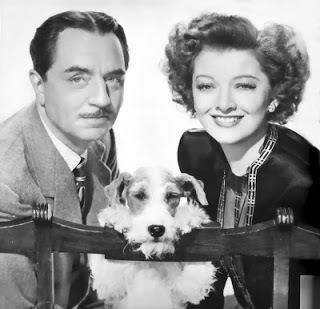 Judging by the story you wrote for Hollywood Mystery—The Poison Pen—You're quite the fan of William Powell and Myrna Loy and the work they did in the classic Thin Man series. What was the first Thin Man movie you saw and how old were you when he saw it? I was in my early 20s (about 25+ years ago) when I first caught The Thin Man on late night television, and I loved it. I don't think it was ever released on VHS or DVD in Australia (but am happy to be proven wrong). It was many years later once online shopping became available that I was able to pick up the series from England, and they have remained a regular part of my movie diet ever since (along with the Michael Shayne movies, with Lloyd Nolan). What's your favorite Thin Man movie and why? Undoubtedly the first one. While all the movies are good, as the series progressed a little bit of what we'd now call 'political correctness' seeped in. When Nick and Nora Charles had a son, the boozy comedic antics were toned back, and they were gently transformed into more respectable role models—albeit with their flaws and nuances.
Judging by the story you wrote for Hollywood Mystery—The Poison Pen—You're quite the fan of William Powell and Myrna Loy and the work they did in the classic Thin Man series. What was the first Thin Man movie you saw and how old were you when he saw it? I was in my early 20s (about 25+ years ago) when I first caught The Thin Man on late night television, and I loved it. I don't think it was ever released on VHS or DVD in Australia (but am happy to be proven wrong). It was many years later once online shopping became available that I was able to pick up the series from England, and they have remained a regular part of my movie diet ever since (along with the Michael Shayne movies, with Lloyd Nolan). What's your favorite Thin Man movie and why? Undoubtedly the first one. While all the movies are good, as the series progressed a little bit of what we'd now call 'political correctness' seeped in. When Nick and Nora Charles had a son, the boozy comedic antics were toned back, and they were gently transformed into more respectable role models—albeit with their flaws and nuances.
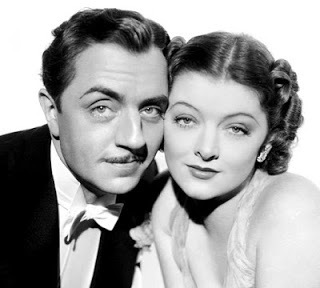 I was impressed by how you captured the style and elegance that was the hallmark of both William Powell and Myrna Loy. How much research into the background of their relationship did you do? Thanks, Derrick. Of course, I watched all the films in the series repeatedly—and a documentary or two, about Powell and Loy. But I did stay away from Dashiell Hammett's original story. I wanted The Poison Pen to reflect the breezy style of the movies, rather than the source material. You planning on writing any more stories about Powell & Loy? I have no plans at the moment, but if there's demand for more, I'd be happy to oblige. Do you have any dreams of writing a Thin Man story and/or novel for Pro Se? That would be fantastic, but I am sure the estate of Dashiell Hammett would have a thing or two to say. Into that mix throw whoever holds the rights to the film series, and I'm guessing it would be a potential minefield. But it is a nice dream. Hey, if a deal can be arranged, sign me up!
I was impressed by how you captured the style and elegance that was the hallmark of both William Powell and Myrna Loy. How much research into the background of their relationship did you do? Thanks, Derrick. Of course, I watched all the films in the series repeatedly—and a documentary or two, about Powell and Loy. But I did stay away from Dashiell Hammett's original story. I wanted The Poison Pen to reflect the breezy style of the movies, rather than the source material. You planning on writing any more stories about Powell & Loy? I have no plans at the moment, but if there's demand for more, I'd be happy to oblige. Do you have any dreams of writing a Thin Man story and/or novel for Pro Se? That would be fantastic, but I am sure the estate of Dashiell Hammett would have a thing or two to say. Into that mix throw whoever holds the rights to the film series, and I'm guessing it would be a potential minefield. But it is a nice dream. Hey, if a deal can be arranged, sign me up!
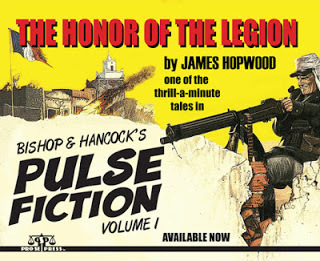 You and Paul Bishop collaborated on creating a character: Mace Bullard of the Foreign Legion. How did that work out? How'd you guys come up with the character? Paul Bishop actually came up with the idea for Mace Bullard for a project he was putting together with Tommy Hancock, called Bishop & Hancock's Pulse Fiction. Pulse Fiction featured a whole swag of new characters, and when I first heard about the project I was interested in an American Indian character who'd washed up on a shore in Africa. But Paul pulled me aside, and said that he wanted me to take a look at Bullard. I hadn't really read any Foreign Legion pulps at that time, but he hooked me up with some
Robert Carse
Legion tales, which I devoured, and realized it was a genre I could sink my teeth into. Paul had Bullard's backstory all mapped out. All I had to do was plonk him in the middle of an adventure. Paul loved what I came up with, and basically said, Kid, the character's all yours now. Do with him what you will. Of course, I run all my Bullard stories past Paul for approval. So far, it's been a blast. Where has he appeared so far and what future plans do you have for him? As hinted at above, he first appeared in
Bishop& Hancock's Pulse Fiction: Volume 1
, in a tale called Honor of the Legion. He returned in The Pirate King for Airship 27's mammoth
Legends of New Pulp Fiction.
Hopefully Bullard will re-appear before the end of the year in Sahara Six, a novella length tale, which sees our intrepid hero transferred to the most remote outpost in Morocco. Then, ssshhhh, this is a little secret, I have plans for a novel length story, called Dead Man's Key. It's a little way off at the moment, but it's coming.
You and Paul Bishop collaborated on creating a character: Mace Bullard of the Foreign Legion. How did that work out? How'd you guys come up with the character? Paul Bishop actually came up with the idea for Mace Bullard for a project he was putting together with Tommy Hancock, called Bishop & Hancock's Pulse Fiction. Pulse Fiction featured a whole swag of new characters, and when I first heard about the project I was interested in an American Indian character who'd washed up on a shore in Africa. But Paul pulled me aside, and said that he wanted me to take a look at Bullard. I hadn't really read any Foreign Legion pulps at that time, but he hooked me up with some
Robert Carse
Legion tales, which I devoured, and realized it was a genre I could sink my teeth into. Paul had Bullard's backstory all mapped out. All I had to do was plonk him in the middle of an adventure. Paul loved what I came up with, and basically said, Kid, the character's all yours now. Do with him what you will. Of course, I run all my Bullard stories past Paul for approval. So far, it's been a blast. Where has he appeared so far and what future plans do you have for him? As hinted at above, he first appeared in
Bishop& Hancock's Pulse Fiction: Volume 1
, in a tale called Honor of the Legion. He returned in The Pirate King for Airship 27's mammoth
Legends of New Pulp Fiction.
Hopefully Bullard will re-appear before the end of the year in Sahara Six, a novella length tale, which sees our intrepid hero transferred to the most remote outpost in Morocco. Then, ssshhhh, this is a little secret, I have plans for a novel length story, called Dead Man's Key. It's a little way off at the moment, but it's coming.
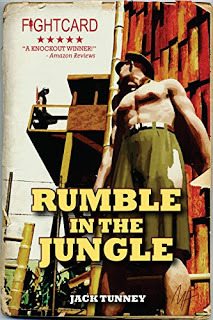 What's a typical Day In The Life of James Hopwood like? Ah, I'm an early riser, so I'll usually have the computer on around 6:00am, and start working on a few projects before breakfast. Then I head to the beach for a spot of snorkling, then return home for my first martini of the day. Sorry, that last sentence is a bare-faced lie—just pretending to live out an Ian Fleming fantasy life. After breakfast I squeeze whatever tasks the day has in store for me, the usual working—stiff drudgery. But it gets me out of the house. However, I carry multiple notepads around with me at all times, and I'm always scribbling notes. At night, if I'm not drawn to the 'idiot box', I'll try to convert some of those scrawled notes into something cohesive.
What's a typical Day In The Life of James Hopwood like? Ah, I'm an early riser, so I'll usually have the computer on around 6:00am, and start working on a few projects before breakfast. Then I head to the beach for a spot of snorkling, then return home for my first martini of the day. Sorry, that last sentence is a bare-faced lie—just pretending to live out an Ian Fleming fantasy life. After breakfast I squeeze whatever tasks the day has in store for me, the usual working—stiff drudgery. But it gets me out of the house. However, I carry multiple notepads around with me at all times, and I'm always scribbling notes. At night, if I'm not drawn to the 'idiot box', I'll try to convert some of those scrawled notes into something cohesive.
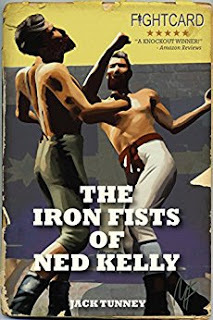 These days, I hate to admit I don't read as much as I used to. My work consists of sitting in front of computers for most of the day, and it can strain my eyes. The sad offshoot is I read less. However, I have really taken to audio books, and find they are a great way to close the day. I have been listening to some of the Robert Stark (Donald Westlake) Parker novels lately, and they are fantastic. Currently I am on The Rare Coin Score.********Cheers, Derrick, thanks for your time, and continued support for your fellow writers in the New Pulp community. DAVID FOSTER/JAMES HOPWOOD’S WEBSITE
CLICK HERE
DAVID FOSTER/JAMES HOPWOOD’S BOOKS
CLICK HERE
OR
CLICK HERE
********
These days, I hate to admit I don't read as much as I used to. My work consists of sitting in front of computers for most of the day, and it can strain my eyes. The sad offshoot is I read less. However, I have really taken to audio books, and find they are a great way to close the day. I have been listening to some of the Robert Stark (Donald Westlake) Parker novels lately, and they are fantastic. Currently I am on The Rare Coin Score.********Cheers, Derrick, thanks for your time, and continued support for your fellow writers in the New Pulp community. DAVID FOSTER/JAMES HOPWOOD’S WEBSITE
CLICK HERE
DAVID FOSTER/JAMES HOPWOOD’S BOOKS
CLICK HERE
OR
CLICK HERE
********
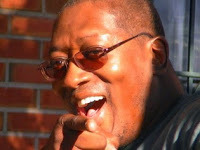 Derrick Ferguson is the creator of the pulptastic adventures of the high adventure hero, Dillon as well as The Adventures of Fortune McCall, among many others. He is also the author of the Fight Card novel, Brooklyn Beatdown. TO VISIT DERRICK’S WEBSITE
CLICK HERE
Derrick Ferguson is the creator of the pulptastic adventures of the high adventure hero, Dillon as well as The Adventures of Fortune McCall, among many others. He is also the author of the Fight Card novel, Brooklyn Beatdown. TO VISIT DERRICK’S WEBSITE
CLICK HERE
Published on May 20, 2017 14:39
May 18, 2017
TAKE THE MONEY AND RUN REDUX
TAKE THE MONEY AND RUN REDUX This is a little out of context, but a friend sent me this clip today from a show I starred in a couple of summers ago on ABC called Take The Money And Run from Jerry Bruckheimer and the folks who put together The Amazing Race (I'm looking at you Eric Beetner). It was an interrogation based reality game show. My partner on the show was Mary Hanlon Stone, truly my sister from another mother. We worked together in the real world for over twenty-five years. Mary is a nationally recognized prosecutor who, as part of vertical prosecution, worked with me on hundreds of cases from initial investigation through conviction. My now friend Ron Stoczynski is the suspect in the cell who I am grilling. Beau Champ is the other suspect walking around in our portable interrogation room. Again, this was an artificial set up, but the real deal when it came to the pressure of interrogation. We are not acting, but playing a very intense game. This show made me very aware of the power interrogators have when it comes to our art. When I watch these clips and see how 'innocent' contestants crack without me having my big levers of guilt and (real) prison time, I makes me constantly aware of the first great edit I install in my detectives: We will never do or say anything to cause an innocent person to admit to something they didnt do. I believe full episodes of the six shows are available to watch on Amazon...
Published on May 18, 2017 14:42
TAKE THE MONEY AND RUN DEDUX
TAKE THE MONEY AND RUN DEDUX This is a little out of context, but a friend sent me this clip today from a show I starred in a couple of summers ago on ABC called Take The Money And Run from Jerry Bruckheimer and the folks who put together The Amazing Race (I'm looking at you Eric Beetner). It was an interrogation based reality game show. My partner on the show was Mary Hanlon Stone, truly my sister from another mother. We worked together in the real world for over twenty-five years. Mary is a nationally recognized prosecutor who, as part of vertical prosecution, worked with me on hundreds of cases from initial investigation through conviction. My now friend Ron Stoczynski is the suspect in the cell who I am grilling. Beau Champ is the other suspect walking around in our portable interrogation room. Again, this was an artificial set up, but the real deal when it came to the pressure of interrogation. We are not acting, but playing a very intense game. This show made me very aware of the power interrogators have when it comes to our art. When I watch these clips and see how 'innocent' contestants crack without me having my big levers of guilt and (real) prison time, I makes me constantly aware of the first great edit I install in my detectives: We will never do or say anything to cause an innocent person to admit to something they didnt do. I believe full episodes of the six shows are available to watch on Amazon...
Published on May 18, 2017 14:42
WET WORK—THE SOAK
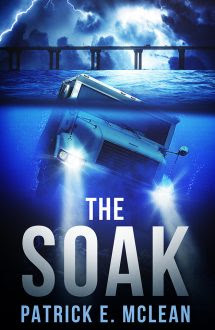
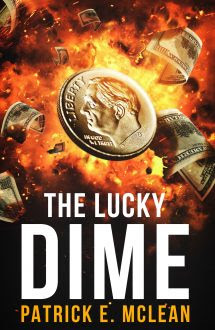 WET WORK—THE SOAK I’ve long been a fan of heist and caper novels. Is there a difference? For me the dividing line is all about tone. Donald Westlake’s Dortmunder novels are clever and often amusing capers. Dortmunder and his crew are not caricatures played for laughs, but they are ordinary guys working hard to make a buck—albeit on the wrong side of the law—while faced with the same battle against Murphy’s law as the rest of us. However, when Westlake is writing the Parker novels under his Richard Stark pseudonym, it’s all about the heist—hardcore, nasty, and with betrayal at every turn. Dortmunder and Parker might recognize the larceny in each other, but they are completely different animals—a teddy bear versus a feral, fanged, predator of the night.
WET WORK—THE SOAK I’ve long been a fan of heist and caper novels. Is there a difference? For me the dividing line is all about tone. Donald Westlake’s Dortmunder novels are clever and often amusing capers. Dortmunder and his crew are not caricatures played for laughs, but they are ordinary guys working hard to make a buck—albeit on the wrong side of the law—while faced with the same battle against Murphy’s law as the rest of us. However, when Westlake is writing the Parker novels under his Richard Stark pseudonym, it’s all about the heist—hardcore, nasty, and with betrayal at every turn. Dortmunder and Parker might recognize the larceny in each other, but they are completely different animals—a teddy bear versus a feral, fanged, predator of the night.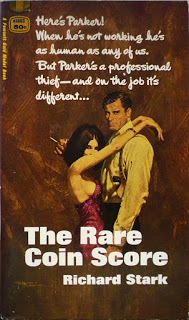
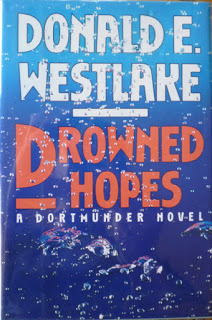 There is a recognized unholy quartet of hardcore heist artists—and make no mistake, every heist is a work of art—Parker (Richard Stark/Donald Westlake), Wyatt (Gary Disher), Nolan (Max Allan Collins), and arguably the toughest of them all, Earl Drake (Dan J. Marlowe). All of them survive on their wits and their sociopathic unsentimentality. There is no give in any of them, and woe be to you if you cross them.
There is a recognized unholy quartet of hardcore heist artists—and make no mistake, every heist is a work of art—Parker (Richard Stark/Donald Westlake), Wyatt (Gary Disher), Nolan (Max Allan Collins), and arguably the toughest of them all, Earl Drake (Dan J. Marlowe). All of them survive on their wits and their sociopathic unsentimentality. There is no give in any of them, and woe be to you if you cross them.
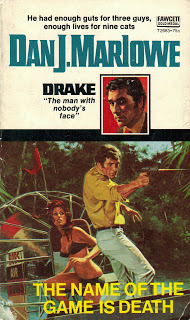 Patrick McLean enters the world of the heist in his new novel, The Soak. Lean, harsh, and cynical, The Soak is a worthy attempt to steal some glory from the established unholy quartet, and is a must read for hardcore crime fans. The Soak is proof the harsh adage—the heist always goes wrong—still functions as an immutable fact of the universe. Nobody knows this better than McLean’s protagonist, Hobbs, a professional heavy-heister past his sell by date, but going for one last score. When the biggest armored car heist in U.S. history goes tits up, Hobbs emerges from the debacle, broken, angry, and with mortality chasing him as hard as the rouge FBI agent on his trail. Hobbs may be on his last legs, but he is hell-bent on revenge. What his enemies don’t know is Hobbs isn’t just a master of the big score—he’s also a stone killer.
Patrick McLean enters the world of the heist in his new novel, The Soak. Lean, harsh, and cynical, The Soak is a worthy attempt to steal some glory from the established unholy quartet, and is a must read for hardcore crime fans. The Soak is proof the harsh adage—the heist always goes wrong—still functions as an immutable fact of the universe. Nobody knows this better than McLean’s protagonist, Hobbs, a professional heavy-heister past his sell by date, but going for one last score. When the biggest armored car heist in U.S. history goes tits up, Hobbs emerges from the debacle, broken, angry, and with mortality chasing him as hard as the rouge FBI agent on his trail. Hobbs may be on his last legs, but he is hell-bent on revenge. What his enemies don’t know is Hobbs isn’t just a master of the big score—he’s also a stone killer.
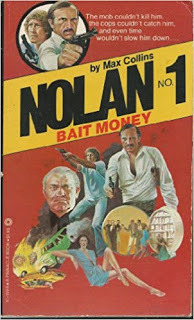
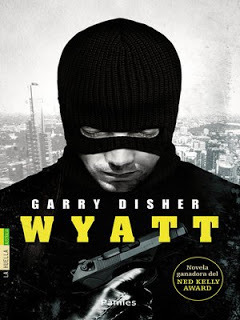 With his character Hobbs facing some tough life decisions at the end of The Soak, Patrick McLean faces the heat by stepping into the bright lights of the interrogation room himself.
With his character Hobbs facing some tough life decisions at the end of The Soak, Patrick McLean faces the heat by stepping into the bright lights of the interrogation room himself.******What background information about you would a law enforcement All Points Bulletin (APB) contain? “Suspect is hatless, repeat, hatless.” Chief Wiggum. Which is another way of saying, I dunno. Father of two, husband of one. Prone to collecting books.
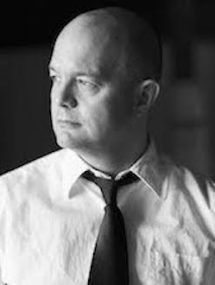 There is a line in your bio which needs clarification. You stated in 1999, you went to Los Angeles, got shot and then got a really good job working on Red Bull Energy Drink Account at an Agency called Lunch. Tell us about the getting shot part. I’m sure there’s a report still in the LA system. Rampart division. Happened May 20th 1999, at about 8:00. Intersection of Vermont and Venice. I was headed north on Vermont. The detectives thought it was a gang initiation thing. Eight months later, the same suspects shot and killed the mayor’s daughter. The mayor’s daughter made the news—my shooting did not make the news. You’ve been involved in martial arts for many years. What can you tell us what role martial arts has played in your life, the discipline you follow, and what, if any, effect martial arts has had on your writing?
There is a line in your bio which needs clarification. You stated in 1999, you went to Los Angeles, got shot and then got a really good job working on Red Bull Energy Drink Account at an Agency called Lunch. Tell us about the getting shot part. I’m sure there’s a report still in the LA system. Rampart division. Happened May 20th 1999, at about 8:00. Intersection of Vermont and Venice. I was headed north on Vermont. The detectives thought it was a gang initiation thing. Eight months later, the same suspects shot and killed the mayor’s daughter. The mayor’s daughter made the news—my shooting did not make the news. You’ve been involved in martial arts for many years. What can you tell us what role martial arts has played in your life, the discipline you follow, and what, if any, effect martial arts has had on your writing?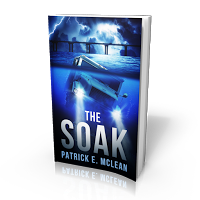 Wow, this could take a while. I did Japanese martial arts for 10+ years. When I discovered Systema, I abandoned them very quickly without much thought. Systema is the smartest, most intelligent, most practical, most creative thing I’ve ever done. All this training has made me approach action, fight scenes, and violence very differently than other writers. I think most writers are lazy. I don’t mean you have to be an expert marksman to write about a sniper, but you do need to fire a rifle and talk to someone who is a really good shot. A conflict, any conflict is its own story. I don’t feel it can be thrown in like a car chase in a 70’s cop movie. Especially in books like The Soak, danger should be as real as possible. Martial arts has also moved me waaay out of my bubble. I’ve travelled extensively and met all kinds of wonderful people who aren’t like me at all. Right now, I have a number of law enforcement personnel who train with me. But training in the martial arts, beyond a rugged first six months, is more about learning to learn and learning to discipline yourself. I continue to train and learn, after all this time, not because it makes me tougher—my wit is still my sharpest instrument—but because it makes me a better dad and a better husband.
Wow, this could take a while. I did Japanese martial arts for 10+ years. When I discovered Systema, I abandoned them very quickly without much thought. Systema is the smartest, most intelligent, most practical, most creative thing I’ve ever done. All this training has made me approach action, fight scenes, and violence very differently than other writers. I think most writers are lazy. I don’t mean you have to be an expert marksman to write about a sniper, but you do need to fire a rifle and talk to someone who is a really good shot. A conflict, any conflict is its own story. I don’t feel it can be thrown in like a car chase in a 70’s cop movie. Especially in books like The Soak, danger should be as real as possible. Martial arts has also moved me waaay out of my bubble. I’ve travelled extensively and met all kinds of wonderful people who aren’t like me at all. Right now, I have a number of law enforcement personnel who train with me. But training in the martial arts, beyond a rugged first six months, is more about learning to learn and learning to discipline yourself. I continue to train and learn, after all this time, not because it makes me tougher—my wit is still my sharpest instrument—but because it makes me a better dad and a better husband.
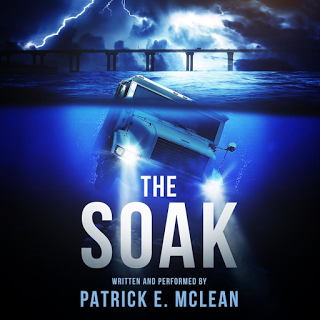 A good tribe—which is what any good dojo or training group is—is a source of deep resilience for its members. In my training—and now teaching—I’ve help vets come back from conflict, cops deal with the pressures of the job, and people who have been assaulted rediscover a physical ease and confidence. Ultimately, that’s far, far more important than being able to nutshot somebody in a dark alley, or take a knife away from somebody after getting cut a few times instead of twenty times? ‘Cause, honestly, I was training long before I got shot, and I’ve trained long after. Statistically, what happened to me was less likely than getting hit by lightning. One of the doctors I saw said, “I drive through that intersection all the time.” To which I replied, “Not last Saturday night you didn’t!” The most practical self-defense I can teach somebody is first, learn to fall—because statistically, that’s what’s going to get you. Especially when you get older, if you fall wrong, you’re going to break a hip. Second, if you don’t feel safe where you are, move! Either with your feet, your car, or by calling a moving company. Were you a fan of heist novels before starting The Soak?
A good tribe—which is what any good dojo or training group is—is a source of deep resilience for its members. In my training—and now teaching—I’ve help vets come back from conflict, cops deal with the pressures of the job, and people who have been assaulted rediscover a physical ease and confidence. Ultimately, that’s far, far more important than being able to nutshot somebody in a dark alley, or take a knife away from somebody after getting cut a few times instead of twenty times? ‘Cause, honestly, I was training long before I got shot, and I’ve trained long after. Statistically, what happened to me was less likely than getting hit by lightning. One of the doctors I saw said, “I drive through that intersection all the time.” To which I replied, “Not last Saturday night you didn’t!” The most practical self-defense I can teach somebody is first, learn to fall—because statistically, that’s what’s going to get you. Especially when you get older, if you fall wrong, you’re going to break a hip. Second, if you don’t feel safe where you are, move! Either with your feet, your car, or by calling a moving company. Were you a fan of heist novels before starting The Soak?
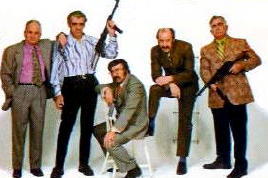 I’ve always liked heist stories, but as far as novels, it took the Parker books to hook me. I wanted more. I wanted to know how Parker met his end. That’s really what I set out to write. I failed at writing a Parker—which is okay, because I wound up writing something else good. And it’s turning out not to be the end—but when a person has tried to suppress his humanity his whole life, it’s bound to take its toll and eventually catch up to him. That and, of course, stealing things. But doing justice to that internal story is what makes the heist mean something, and the book not suck. I’m a fan of the Parker novels for so many reasons. They’re a master class in plotting. I love twists and turns. But I like the uncompromisingly tough characters. I feel like fiction has gotten a bit wishy-washy. As some stories are ruined when you think, “Why doesn’t she just pick up her cellphone and call the guy?” a lot of things are ruined for me when I think, “Why doesn’t he just hit ‘em?” What came first, the idea for the heist or the decision to write a crime novel? What came first was the feeling. A feeling of grit and real places. Of trying to loosen a bolt on a cold day, having the wrench slip and barking your knuckles on the engine block. The cold hurt of it sinking deep into the bone and aching. And knowing you have to fix the engine, or you’re not going be able to drive to work tomorrow.
I’ve always liked heist stories, but as far as novels, it took the Parker books to hook me. I wanted more. I wanted to know how Parker met his end. That’s really what I set out to write. I failed at writing a Parker—which is okay, because I wound up writing something else good. And it’s turning out not to be the end—but when a person has tried to suppress his humanity his whole life, it’s bound to take its toll and eventually catch up to him. That and, of course, stealing things. But doing justice to that internal story is what makes the heist mean something, and the book not suck. I’m a fan of the Parker novels for so many reasons. They’re a master class in plotting. I love twists and turns. But I like the uncompromisingly tough characters. I feel like fiction has gotten a bit wishy-washy. As some stories are ruined when you think, “Why doesn’t she just pick up her cellphone and call the guy?” a lot of things are ruined for me when I think, “Why doesn’t he just hit ‘em?” What came first, the idea for the heist or the decision to write a crime novel? What came first was the feeling. A feeling of grit and real places. Of trying to loosen a bolt on a cold day, having the wrench slip and barking your knuckles on the engine block. The cold hurt of it sinking deep into the bone and aching. And knowing you have to fix the engine, or you’re not going be able to drive to work tomorrow.
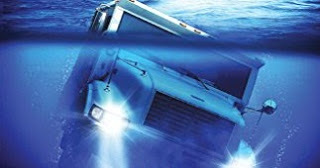 So much of what we get fed now are fantasy stories. Superhuman characters averting the end of the world against absurd backdrops. What I wanted was to have the stakes be as real and personal and grounded as possible. Simenon and Maigret. Arthur Conan Doyle and Holmes. As weird and fun as the Sherlock Holmes stories can be, they are grounded in that particular London. Hyper-detailed. I kept writing stories about crime and heists and Hobbs and lots of other characters—and a lot of it was great—but I could never find the right heist, the full story. I could never get a firm hold on the book, you know? When I finally had the idea for the armored car heist in The Soak, it was in the context of something Hobbs had done. And instantly it was, yeah, that’s the story—right there. The creative process, man, it’s a lot more like wrestling than anybody on the outside suspects. Do you see a difference between heist novels and caper novels and, if so, where do you draw the line?
So much of what we get fed now are fantasy stories. Superhuman characters averting the end of the world against absurd backdrops. What I wanted was to have the stakes be as real and personal and grounded as possible. Simenon and Maigret. Arthur Conan Doyle and Holmes. As weird and fun as the Sherlock Holmes stories can be, they are grounded in that particular London. Hyper-detailed. I kept writing stories about crime and heists and Hobbs and lots of other characters—and a lot of it was great—but I could never find the right heist, the full story. I could never get a firm hold on the book, you know? When I finally had the idea for the armored car heist in The Soak, it was in the context of something Hobbs had done. And instantly it was, yeah, that’s the story—right there. The creative process, man, it’s a lot more like wrestling than anybody on the outside suspects. Do you see a difference between heist novels and caper novels and, if so, where do you draw the line?
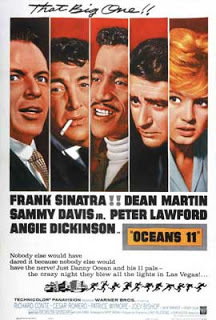 For me, a caper is fun. Both versions of Oceans 11 (which I love equally) are fun— even madcap in places. A heist has grit to it. It goes wrong, somebody is getting hurt. Somebody is going to jail. And it always goes wrong. Do you have a favorite heist or caper film? For capers, I love the second Ocean’s 11. I think it’s a tremendous caper film and Soderberg is one of my favorite directors. And it’s all pulled off without anyone pointing a gun at another character. As far as heist films, I can cite the usual suspects, but what I really like right now is that mid-70’s grit. Like The Limey (which wasn’t made in the 70’s but is very New Wave). The tension and the violence in The Limeyis incredible, completely minimal, and completely terrifying. Most people can eat dinner while watching a movie where a room full of people get mowed down with a machine gun, and not think twice about it. But in real life, you watch a guy accidentally slice his hand with a box cutter and you want to throw up.
For me, a caper is fun. Both versions of Oceans 11 (which I love equally) are fun— even madcap in places. A heist has grit to it. It goes wrong, somebody is getting hurt. Somebody is going to jail. And it always goes wrong. Do you have a favorite heist or caper film? For capers, I love the second Ocean’s 11. I think it’s a tremendous caper film and Soderberg is one of my favorite directors. And it’s all pulled off without anyone pointing a gun at another character. As far as heist films, I can cite the usual suspects, but what I really like right now is that mid-70’s grit. Like The Limey (which wasn’t made in the 70’s but is very New Wave). The tension and the violence in The Limeyis incredible, completely minimal, and completely terrifying. Most people can eat dinner while watching a movie where a room full of people get mowed down with a machine gun, and not think twice about it. But in real life, you watch a guy accidentally slice his hand with a box cutter and you want to throw up.
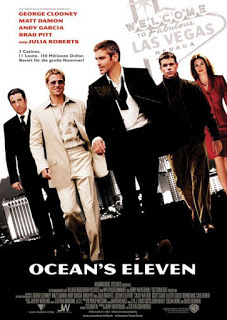 Why do you think there is a fascination with heist and caper stories? I think all fiction grants a kind of release. A kind of antidote for the anxieties of the time, or a wish/fantasy fulfillment. Reading The Odyssey the first time, I didn’t understand why so much time and effort was spend explaining what they ate and drank. Then I realized, the story was for people who really didn’t have food security. Maybe dinner was uncertain for them and a feast and riches were unthinkable. As for the appeal, H.L. Mencken said, “Every normal man must be tempted at times to spit on his hands, hoist the black flag, and begin to slit throats.” Look, I don’t know anybody who doesn’t sometime feel powerless against the complexity and speed of the modern world. One antidote is the thriller—it’s the genre of our time. But another antidote is the heist and the caper. They are fundamentally anti-authoritarian. The system is broken, but I can make my own crack in it and protect the one’s I love/get what I need. I wrote the book, and I consume stories like it, so I can be happy. It’s interesting. When I was unhappy, I wrote funny books. Now, I’m much happier, and I write darker, more violent books. Maybe it’s all a matter of venting the spleen J. How much research did you do into armored cars and robberies for The Soak? A lot of googling and a lot more thinking. I picked the idea up from an account of an armored car accident that actually happened in South Florida—Miami, I think. The bit about the fire is an actual story as well. I totally made up the term flipped armadillo. The theme of professionalism runs through The Soak. Why do you feel this is important in today’s world?
Why do you think there is a fascination with heist and caper stories? I think all fiction grants a kind of release. A kind of antidote for the anxieties of the time, or a wish/fantasy fulfillment. Reading The Odyssey the first time, I didn’t understand why so much time and effort was spend explaining what they ate and drank. Then I realized, the story was for people who really didn’t have food security. Maybe dinner was uncertain for them and a feast and riches were unthinkable. As for the appeal, H.L. Mencken said, “Every normal man must be tempted at times to spit on his hands, hoist the black flag, and begin to slit throats.” Look, I don’t know anybody who doesn’t sometime feel powerless against the complexity and speed of the modern world. One antidote is the thriller—it’s the genre of our time. But another antidote is the heist and the caper. They are fundamentally anti-authoritarian. The system is broken, but I can make my own crack in it and protect the one’s I love/get what I need. I wrote the book, and I consume stories like it, so I can be happy. It’s interesting. When I was unhappy, I wrote funny books. Now, I’m much happier, and I write darker, more violent books. Maybe it’s all a matter of venting the spleen J. How much research did you do into armored cars and robberies for The Soak? A lot of googling and a lot more thinking. I picked the idea up from an account of an armored car accident that actually happened in South Florida—Miami, I think. The bit about the fire is an actual story as well. I totally made up the term flipped armadillo. The theme of professionalism runs through The Soak. Why do you feel this is important in today’s world?
 Wow, in today’s world? That’s deep. Initially, it was because sloppy work pisses me off. But, upon reflection, it has more to do with a world devoid of religious faith and deep traditions (nobody’s grandfather was a project manager or a compliance professional). I believe the idea you do your job and do it well—as a professional—is one of the only things holding people together. This theme of professionalism makes up at least a third of all Westerns—the Lawman does his job because it’s his job. Alan, a pivotal character in The Soak, is a newbie entering the world of hardcore heists. Alan reaches a turning point in this sequence: ...After a while Alan broke the silence. "It’s the waiting, isn’t it? The waiting is what makes or breaks you.” And that’s when Hobbs knew he [Alan] finally understood…What do you see as the mindset change when a character like Alan morphs from straight to criminal?
Wow, in today’s world? That’s deep. Initially, it was because sloppy work pisses me off. But, upon reflection, it has more to do with a world devoid of religious faith and deep traditions (nobody’s grandfather was a project manager or a compliance professional). I believe the idea you do your job and do it well—as a professional—is one of the only things holding people together. This theme of professionalism makes up at least a third of all Westerns—the Lawman does his job because it’s his job. Alan, a pivotal character in The Soak, is a newbie entering the world of hardcore heists. Alan reaches a turning point in this sequence: ...After a while Alan broke the silence. "It’s the waiting, isn’t it? The waiting is what makes or breaks you.” And that’s when Hobbs knew he [Alan] finally understood…What do you see as the mindset change when a character like Alan morphs from straight to criminal?
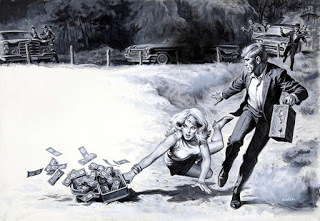 It’s really the change from amateur to pro in anything. You get the secret knowledge that comes from experience. All the things you were originally worried about or excited about don’t really matter anymore. In that moment, Alan realizes, it’s not how you deal with the excitement of it, but how you deal with the boredom that makes the different. Stephen King said every interviewer asked him about where he got his ideas, but he’d never had an interviewer ask him about where he lived. How he used the language itself and what it meant to him. Nobody wants to know about the boring part of writing and rewriting, but honestly, you spend a lot of time fixing sentences and paragraphs. A dilettante is excited to have written something they think is great. The pro, on the other hand, says, “Okay, what’s for dinner,” and maybe, “Well, that felt good. I hope I don’t hate it when I read it again.” In creating Alan did you feel the character had the seeds of criminality dormant in his DNA, or is the step into hardcore crime any straight could take?
It’s really the change from amateur to pro in anything. You get the secret knowledge that comes from experience. All the things you were originally worried about or excited about don’t really matter anymore. In that moment, Alan realizes, it’s not how you deal with the excitement of it, but how you deal with the boredom that makes the different. Stephen King said every interviewer asked him about where he got his ideas, but he’d never had an interviewer ask him about where he lived. How he used the language itself and what it meant to him. Nobody wants to know about the boring part of writing and rewriting, but honestly, you spend a lot of time fixing sentences and paragraphs. A dilettante is excited to have written something they think is great. The pro, on the other hand, says, “Okay, what’s for dinner,” and maybe, “Well, that felt good. I hope I don’t hate it when I read it again.” In creating Alan did you feel the character had the seeds of criminality dormant in his DNA, or is the step into hardcore crime any straight could take?
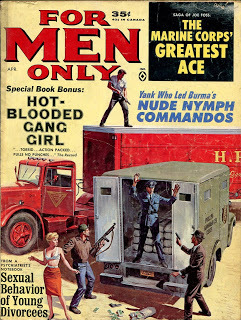 Nah, Alan was searching for a rite of passage. And because the modern world didn’t provide one for him, and there was no strong father figure in his life, he broke bad. As far as the question in general, most of the people I know with criminal tendencies find ways to exercise them without getting in trouble. I have a friend who’s a police officer—super nice guy, but a really tough guy. He flat out told me he took the job in the worst part of town because part of him really likes roughing people up and this was a constructive way to do it. It’s one of the things that makes good writing tough, nobody thinks of themselves as a villain. So you can’t write characters that way with any dimension to them. For example, the kid who shot me? He wasn’t a villain. Getting into a gang was the best thing he knew how to do. It might have been stupid, or a failure of imagination, or many other things—and he might have known it was wrong—but he didn’t see himself as evil.
Nah, Alan was searching for a rite of passage. And because the modern world didn’t provide one for him, and there was no strong father figure in his life, he broke bad. As far as the question in general, most of the people I know with criminal tendencies find ways to exercise them without getting in trouble. I have a friend who’s a police officer—super nice guy, but a really tough guy. He flat out told me he took the job in the worst part of town because part of him really likes roughing people up and this was a constructive way to do it. It’s one of the things that makes good writing tough, nobody thinks of themselves as a villain. So you can’t write characters that way with any dimension to them. For example, the kid who shot me? He wasn’t a villain. Getting into a gang was the best thing he knew how to do. It might have been stupid, or a failure of imagination, or many other things—and he might have known it was wrong—but he didn’t see himself as evil.
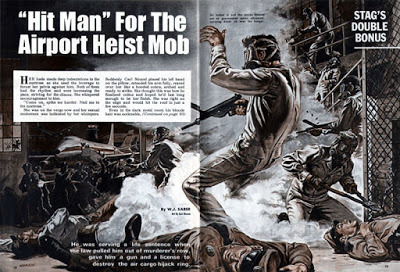 Hobbs, the main protagonist of The Soak, is never going to be a CPA or a Walmart greeter. He has chosen large scale heists as a way of life, which he equates with freedom in this sequence: Hobbs hadn’t been born with wealth, but he didn’t want to live his life knuckling under for anyone. If it took courage and discipline and violence to tear a life for himself out of society, well, fine. He’d paid the cost, and he’d go on paying— as long and as much as it took to stay free...Can you tell us how you developed Hobbs’ character and thought process? That’s me coming through. I’m pretty fiercely independent. I’ve worked for myself since 2002. Sometimes, I’ve felt like an idiot doing so. And it can be scary providing for a family that way, but there’s no way I could be the drone in Sector 7G. In another sequence, Hobbs lays out the difficulties of committing crime in the modern world...Over the years Hobbs had seen a lot of guys leave the straight world behind. It wasn’t an easy transition. With most of them, you could tell right away they wouldn’t make it . The heavy heist was a rough trade, and perhaps a dying game as well. It was harder and harder to get away with anything...cameras and...computers dragging the world closer and closer together. Cops dressed like storm troopers now and were armed to the teeth. Hobbs was a bad man, sure, but even he saw something wrong with this. The balance had tipped too far in favor of authority, and it was harder and harder for a red-blooded man to make any move on his own...How does this reality make it difficult for you as a writer and how does it affect Hobbs’ future? It’s hard to write an original heist novel. But I’ve gotten to the point where it makes it easier. New challenges to overcome. I’ve got a few outlined anyway.
Hobbs, the main protagonist of The Soak, is never going to be a CPA or a Walmart greeter. He has chosen large scale heists as a way of life, which he equates with freedom in this sequence: Hobbs hadn’t been born with wealth, but he didn’t want to live his life knuckling under for anyone. If it took courage and discipline and violence to tear a life for himself out of society, well, fine. He’d paid the cost, and he’d go on paying— as long and as much as it took to stay free...Can you tell us how you developed Hobbs’ character and thought process? That’s me coming through. I’m pretty fiercely independent. I’ve worked for myself since 2002. Sometimes, I’ve felt like an idiot doing so. And it can be scary providing for a family that way, but there’s no way I could be the drone in Sector 7G. In another sequence, Hobbs lays out the difficulties of committing crime in the modern world...Over the years Hobbs had seen a lot of guys leave the straight world behind. It wasn’t an easy transition. With most of them, you could tell right away they wouldn’t make it . The heavy heist was a rough trade, and perhaps a dying game as well. It was harder and harder to get away with anything...cameras and...computers dragging the world closer and closer together. Cops dressed like storm troopers now and were armed to the teeth. Hobbs was a bad man, sure, but even he saw something wrong with this. The balance had tipped too far in favor of authority, and it was harder and harder for a red-blooded man to make any move on his own...How does this reality make it difficult for you as a writer and how does it affect Hobbs’ future? It’s hard to write an original heist novel. But I’ve gotten to the point where it makes it easier. New challenges to overcome. I’ve got a few outlined anyway.
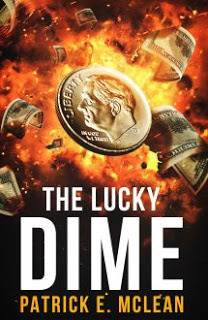 The Lucky Dime is a short-story prequel to The Soak. Did you write it before or after you finished The Soak and what was your goal in having it published? After. It was a flashback in a larger novel that didn’t quite work. We gave it away to everybody on a few email lists to make them more likely to try The Soak. At ninety-nine cents, it’s also a good gateway drug. Having said that, I love the story. Plus, it frees me up to write period prequels, I guess. Do you prefer to write/read series books or standalones? I’ve had a really hard time figuring out how to write series, but I think I’ve got it now. Lee and Joel at Brash Books really helped me. They were almost gentle about it, too. Is there a specific book or author you find yourself recommending over and over?
The Lucky Dime is a short-story prequel to The Soak. Did you write it before or after you finished The Soak and what was your goal in having it published? After. It was a flashback in a larger novel that didn’t quite work. We gave it away to everybody on a few email lists to make them more likely to try The Soak. At ninety-nine cents, it’s also a good gateway drug. Having said that, I love the story. Plus, it frees me up to write period prequels, I guess. Do you prefer to write/read series books or standalones? I’ve had a really hard time figuring out how to write series, but I think I’ve got it now. Lee and Joel at Brash Books really helped me. They were almost gentle about it, too. Is there a specific book or author you find yourself recommending over and over?
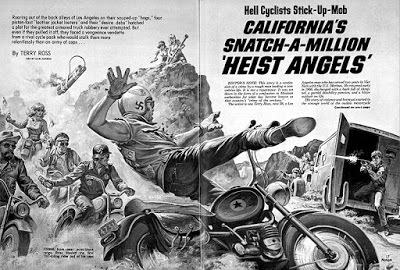 Recommending a book is like giving someone a prescription. I recommend the Richard Stark novels a lot, of course, or those written under the author’s real name, Donald Westlake. Otherwise, it depends on who I’m giving the recommendation. For a friend who is struggling, I recommend The War of Art and Epictetus. That kind of thing. I spend a lot of time coming up with ways to get people to read the classics, or to read outside their favorite genres. Is there a book you’ve returned to again and again? Mostly the classics. In the genre and outside of it. I love Red Harvest by Hammett. What fictional characters would you like to have a beer with? Falstaff. Fletch. Certainly not Parker. A guy could get dead quick drinking with Parker. However, I’d drink with Grofield any day of the week. Odysseus, but I’m not taking a boat trip with him. ******Thx to Patrick for sitting down under the bright lights of the interrogation room and getting a feel for his characters and the dark side of crime and why the heist always goes wrong. TO VISIT PATRICK’S WEBSITE CLICK HERE
Recommending a book is like giving someone a prescription. I recommend the Richard Stark novels a lot, of course, or those written under the author’s real name, Donald Westlake. Otherwise, it depends on who I’m giving the recommendation. For a friend who is struggling, I recommend The War of Art and Epictetus. That kind of thing. I spend a lot of time coming up with ways to get people to read the classics, or to read outside their favorite genres. Is there a book you’ve returned to again and again? Mostly the classics. In the genre and outside of it. I love Red Harvest by Hammett. What fictional characters would you like to have a beer with? Falstaff. Fletch. Certainly not Parker. A guy could get dead quick drinking with Parker. However, I’d drink with Grofield any day of the week. Odysseus, but I’m not taking a boat trip with him. ******Thx to Patrick for sitting down under the bright lights of the interrogation room and getting a feel for his characters and the dark side of crime and why the heist always goes wrong. TO VISIT PATRICK’S WEBSITE CLICK HERE
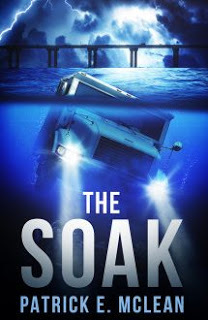 THE SOAK A searing crime novel that introduces an exhilarating new voice in noir fiction that’s as sharp, cruel, and relentless as the story’s unforgettable hero. Hobbs is an aging, professional thief who chases one last, big score into the eye of a Florida hurricane. He emerges a broken man, hell-bent on revenge while out-running his own mortality and a ruthless FBI agent gone rogue.
THE SOAK A searing crime novel that introduces an exhilarating new voice in noir fiction that’s as sharp, cruel, and relentless as the story’s unforgettable hero. Hobbs is an aging, professional thief who chases one last, big score into the eye of a Florida hurricane. He emerges a broken man, hell-bent on revenge while out-running his own mortality and a ruthless FBI agent gone rogue. 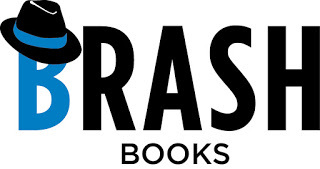 "Richard Stark fans will relish heistmeister Hobbs in this well-plotted tale of robbery, murder and revenge." Publishers Weekly "A dark, funny, pitch-perfect take on the heist novel and worthy of comparison to Richard Stark and Garry Disher." Scott Phillips, author of The Ice Harvest "The Soak is tense, fast moving, intricately plotted and layered with the moral ambiguity of the best crime fiction." Garry Disher, multiple Ned Kelly Award winning author of the Wyatt novels "Fast and brutal, gripping and ingenious, this tale of an analogue thief in a digital age had me locked in from page one." Stephen Gallagher, author of The Bedlam Detective "An extraordinarily dark, twisting noir novel with crackling dialogue and action, featuring an aging anti-hero who should be checking out the Early Bird specials at a local restaurant, but instead is on a blood-soaked mission of revenge. Highly recommended… and you’ll never look at an AARP card the same way again." Brendan DuBois, Edgar award-winning author of the Lewis Cole mystery series "A thoroughly engaging anatomy-of-a-heist style crime novel. Hobbs is wonderfully gritty and irascible, an old school pro, and yet charming in his own hard-boiled way." Victor Gischler, Edgar Award-nominated and Anthony Award-winning author of Gun Monkeys
"Richard Stark fans will relish heistmeister Hobbs in this well-plotted tale of robbery, murder and revenge." Publishers Weekly "A dark, funny, pitch-perfect take on the heist novel and worthy of comparison to Richard Stark and Garry Disher." Scott Phillips, author of The Ice Harvest "The Soak is tense, fast moving, intricately plotted and layered with the moral ambiguity of the best crime fiction." Garry Disher, multiple Ned Kelly Award winning author of the Wyatt novels "Fast and brutal, gripping and ingenious, this tale of an analogue thief in a digital age had me locked in from page one." Stephen Gallagher, author of The Bedlam Detective "An extraordinarily dark, twisting noir novel with crackling dialogue and action, featuring an aging anti-hero who should be checking out the Early Bird specials at a local restaurant, but instead is on a blood-soaked mission of revenge. Highly recommended… and you’ll never look at an AARP card the same way again." Brendan DuBois, Edgar award-winning author of the Lewis Cole mystery series "A thoroughly engaging anatomy-of-a-heist style crime novel. Hobbs is wonderfully gritty and irascible, an old school pro, and yet charming in his own hard-boiled way." Victor Gischler, Edgar Award-nominated and Anthony Award-winning author of Gun Monkeys
Published on May 18, 2017 09:37
May 16, 2017
THE CZAR OF ACTION NOIR ~ ERIC BEETNER
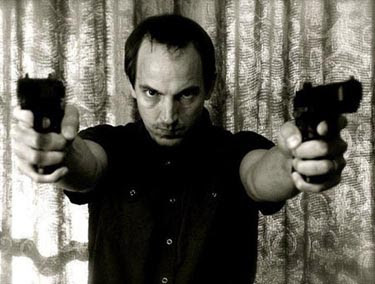 THE CZAR OF ACTION NOIR ~ ERIC BEETNER If you want pistol-whipping, boot-stomping, nasty noir, then Eric Beetner is the guy for you—or his books anyway. Eric himself is wonderful blend of kind and cool. He’s the quick-fisted presence behind two of the best Fight Card novels—
Split Decision
and
A Mouthful Of Blood
—with his work since exploding across the hardboiled mystery scene. Rumrunners, Leadfoot, The Devil Doesn’t Want Me, When The Devil Comes To Call, and the upcoming The Devil At Your Door are just a few of the tough, noir influenced works Eric has published to critical acclaim...********
Do you mark or write in your books as you read, or does the idea horrify you?
In novels, yes the idea horrifies me. What monster would do that? Now, in reference books it’s another story. Specifically I have several film books where I check off films I’ve seen in genres like Film Noir and Our Gang shorts. I’m sure if you ever investigated my office those books would seem like the obsessive ticks of a madman.
THE CZAR OF ACTION NOIR ~ ERIC BEETNER If you want pistol-whipping, boot-stomping, nasty noir, then Eric Beetner is the guy for you—or his books anyway. Eric himself is wonderful blend of kind and cool. He’s the quick-fisted presence behind two of the best Fight Card novels—
Split Decision
and
A Mouthful Of Blood
—with his work since exploding across the hardboiled mystery scene. Rumrunners, Leadfoot, The Devil Doesn’t Want Me, When The Devil Comes To Call, and the upcoming The Devil At Your Door are just a few of the tough, noir influenced works Eric has published to critical acclaim...********
Do you mark or write in your books as you read, or does the idea horrify you?
In novels, yes the idea horrifies me. What monster would do that? Now, in reference books it’s another story. Specifically I have several film books where I check off films I’ve seen in genres like Film Noir and Our Gang shorts. I’m sure if you ever investigated my office those books would seem like the obsessive ticks of a madman.
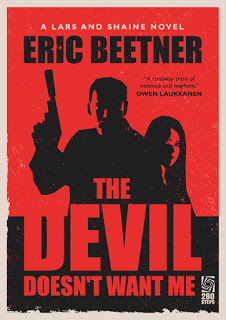 How do you keep your place in a book? Bookmark? Dog-ears? Laying the book flat open?
I’m a bookmark guy and the great thing about them is that you can make anything into a bookmark. An old receipt. A scrap of paper. A dollar bill. A gum wrapper. A losing lottery ticket. An old photo. Seriously, I’m an artist at repurposing things into bookmarks.
Do you have a favorite snack to eat while you read?
I do 90% of my reading while at my lunch break at work so I’m usually covered for eating and reading. The two really do go hand in hand for me. The mark of a good book is if it has multiple stains in it from curry or ketchup or soup.
What book did you love as a child?
One I really remember is called The Great Cheese Conspiracy. It’s about a gang of mice who live in an old movie house watching old gangster films and get inspired to rob the cheese shop next door. I think it inspired my love of crime fiction at a young age.
How do you keep your place in a book? Bookmark? Dog-ears? Laying the book flat open?
I’m a bookmark guy and the great thing about them is that you can make anything into a bookmark. An old receipt. A scrap of paper. A dollar bill. A gum wrapper. A losing lottery ticket. An old photo. Seriously, I’m an artist at repurposing things into bookmarks.
Do you have a favorite snack to eat while you read?
I do 90% of my reading while at my lunch break at work so I’m usually covered for eating and reading. The two really do go hand in hand for me. The mark of a good book is if it has multiple stains in it from curry or ketchup or soup.
What book did you love as a child?
One I really remember is called The Great Cheese Conspiracy. It’s about a gang of mice who live in an old movie house watching old gangster films and get inspired to rob the cheese shop next door. I think it inspired my love of crime fiction at a young age.
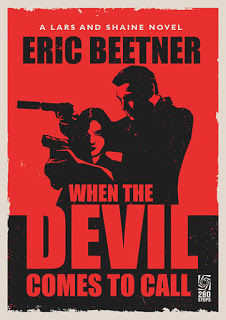 What book you would read to your kids?
Another favorite from childhood I had the pleasure to read to my girls is The Phantom Tollbooth. My girls are reading on their own now so this is close to the last book they let me read to them, but it is such an important book to me. I had to share it with them
What book made you want to be a writer?
I think the one that turned the tide and made me want to commit to crime fiction was A Simple Plan by Scott Smith. Before that I was more omnivorous as a reader, but that solidified the types of stories I like best.
Do you read mostly fiction or nonfiction or an even mix?
Mostly fiction, but I listen to audiobooks during my commute and I like a good nonfiction listen. Entertainment biographies or histories like Lost In Shangri-La or Frozen In Time, two I can highly recommend.
What book you would read to your kids?
Another favorite from childhood I had the pleasure to read to my girls is The Phantom Tollbooth. My girls are reading on their own now so this is close to the last book they let me read to them, but it is such an important book to me. I had to share it with them
What book made you want to be a writer?
I think the one that turned the tide and made me want to commit to crime fiction was A Simple Plan by Scott Smith. Before that I was more omnivorous as a reader, but that solidified the types of stories I like best.
Do you read mostly fiction or nonfiction or an even mix?
Mostly fiction, but I listen to audiobooks during my commute and I like a good nonfiction listen. Entertainment biographies or histories like Lost In Shangri-La or Frozen In Time, two I can highly recommend.
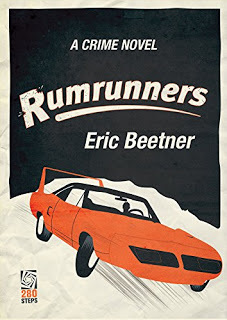 Do you always read to the end of a chapter or can you stop anywhere?
Always to the end. I write like that too. I need to finish a thought before I leave off from the night. Not sure what that says about me.
Do you stop reading to look up unfamiliar words?
I will, but luckily I don’t encounter that too often. I guess I need to read more challenging books.
How do you organize your books—by genre, title, author’s last name, random stacks?
By author for the new stuff. I have a huge rack of vintage paperbacks arranged by title since so many are by a single author and I usually know them by the cover and title so if I go searching for something I’m more likely to find it by title.
Do you always read to the end of a chapter or can you stop anywhere?
Always to the end. I write like that too. I need to finish a thought before I leave off from the night. Not sure what that says about me.
Do you stop reading to look up unfamiliar words?
I will, but luckily I don’t encounter that too often. I guess I need to read more challenging books.
How do you organize your books—by genre, title, author’s last name, random stacks?
By author for the new stuff. I have a huge rack of vintage paperbacks arranged by title since so many are by a single author and I usually know them by the cover and title so if I go searching for something I’m more likely to find it by title.
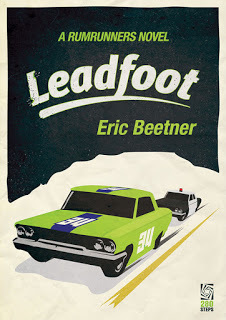 What is your favorite classic?
Oh, man, making me choose! I do my best to read the classics of crime. I know I have a long way to go, but my favorite for now might be The Hot Spot by Charles Williams. It was originally titled Hell Hath No Furywhen it came but the movie title is how it is republished today. But ask me again in 5 minutes and I’ll switch to something else like The Kiss Off or The Big Stealor Rendezvous In Black or Double Indemnity or…or…or…
What classic have you never been able to read?
Maybe Crime and Punishment? But to be honest I haven’t tried that hard. I know better than to try some classic detective fiction like Agatha Christie because I know it’s just not my thing.
What is your favorite classic?
Oh, man, making me choose! I do my best to read the classics of crime. I know I have a long way to go, but my favorite for now might be The Hot Spot by Charles Williams. It was originally titled Hell Hath No Furywhen it came but the movie title is how it is republished today. But ask me again in 5 minutes and I’ll switch to something else like The Kiss Off or The Big Stealor Rendezvous In Black or Double Indemnity or…or…or…
What classic have you never been able to read?
Maybe Crime and Punishment? But to be honest I haven’t tried that hard. I know better than to try some classic detective fiction like Agatha Christie because I know it’s just not my thing.
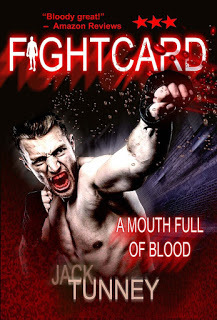 What classic have you pretended to read?
I never pretend. I’ll cop to not reading something every time. Talented Mr. Ripley is one I’ve never read but probably should. I own it. Just never read it.
What is the last book you read?
Justice by Larry Watson. It’s a prequel to his novel Montana, 1948 and it was great. Watson is a bit of a departure for me in that they aren’t really crime novels (though some dark things happen in them) but I absolutely love his writing.
What is the last book you bought?
I bought The House Husband by Duane Swierczynski and some guy named James Patterson. It’s part of the Bookshots novella series and it’s great. Also a novel, The Neon Lights Are Veins by Nolan Knight, a local LA writer who we’ve had read at Noir at The Bar. It’s his debut novel and I’m excited to dive in.
Do you read one book from start to finish, or do you have several on the go?
I usually have an at-work book, an at-home book and an in-the-car audiobook. I’m between audiobooks right now waiting for the next one come free at the library. In that case I listen to podcasts.
What classic have you pretended to read?
I never pretend. I’ll cop to not reading something every time. Talented Mr. Ripley is one I’ve never read but probably should. I own it. Just never read it.
What is the last book you read?
Justice by Larry Watson. It’s a prequel to his novel Montana, 1948 and it was great. Watson is a bit of a departure for me in that they aren’t really crime novels (though some dark things happen in them) but I absolutely love his writing.
What is the last book you bought?
I bought The House Husband by Duane Swierczynski and some guy named James Patterson. It’s part of the Bookshots novella series and it’s great. Also a novel, The Neon Lights Are Veins by Nolan Knight, a local LA writer who we’ve had read at Noir at The Bar. It’s his debut novel and I’m excited to dive in.
Do you read one book from start to finish, or do you have several on the go?
I usually have an at-work book, an at-home book and an in-the-car audiobook. I’m between audiobooks right now waiting for the next one come free at the library. In that case I listen to podcasts.
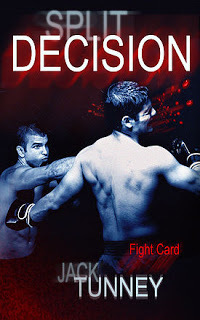 Do you have a favorite time/place to read?
Midday at whatever restaurant I’m in. I’m good to go almost anywhere though, except a moving car. I’ll barf in two minutes flat.
Do you prefer series books or standalones?
Generally I like standalones, but I’ve come around to more series. Most of my favorite books when I look back at it are standalone, though.
What book to movie adaptation have you loved?
Back to A Simple Plan. They really nailed it.
Do you have a favorite time/place to read?
Midday at whatever restaurant I’m in. I’m good to go almost anywhere though, except a moving car. I’ll barf in two minutes flat.
Do you prefer series books or standalones?
Generally I like standalones, but I’ve come around to more series. Most of my favorite books when I look back at it are standalone, though.
What book to movie adaptation have you loved?
Back to A Simple Plan. They really nailed it.
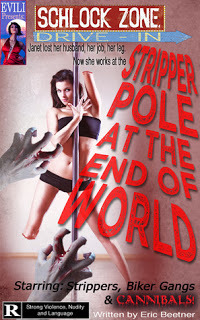 What book would you like to see as a movie?
Well, any of mine, of course. I’d like to see Gun Monkeys by Victor Gischler. With the right cast, it could be a lot of fun.
What book would you like to see as a movie?
Well, any of mine, of course. I’d like to see Gun Monkeys by Victor Gischler. With the right cast, it could be a lot of fun.
What imaginary place would you like to live? It’s far away enough to be imaginary and mythical in my mind, but I’d love to have lived and worked in Hollywood in the 1940s. A great time for film. What genre would you read if you were limited to one? Hardboiled crime fiction What book have you returned to again and again? I don’t re-read very much, but when I even think of it I always want to start with Wild At Heartby Barry Gifford. Is there a specific book or author you find yourself recommending over and over? I think people must be getting sick of me pushing Jake Hinkson on them. His novels are amazing noir done right. Hell On Church St.and No Tomorrow are modern classics in my eyes. I keep a small stack of novels that are doubles of titles I already own and love. If I see one in a Goodwill or a dollar bookstore I’ll grab it just to have it to give away to someone. In that stack now are Small Crimes by Dave Zeltserman, Twisted City by Jason Starr, A Very Simple Crime by Grant Jerkins, The Postman Always Rings Twice by James M. Cain. I just sent a copy of The Terror Of Living by Urban Waite to a friend in Chicago. I love sharing a good book!
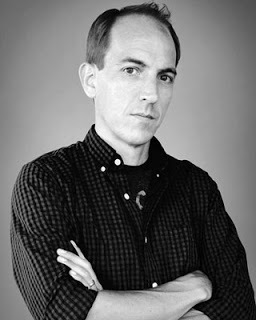 What was the last novel to make you laugh and the last to make you cry?
Martin Short’s autobiography I Must Say was fantastic. Do the audiobook to get the full effect. In a way it had the funniest and some of the saddest parts of a book so you get both in one volume.
What fictional character would you like to have a beer with?
Oh, man, I’ll say the Amlingmeyer brothers from Steve Hockensmith’s Holmes on the Range series. Or Hap and Leonard from Joe Lansdale’s series. Both pairs get into a lot of trouble though, so you’d have to watch your back.********Eric’s latest book, When The Devil Comes To Call, continues the adventures of aging hitman Lars and Shaine, the high spirited daughter of one of Lar’s targets who has more mayhem in one fist than most men in their entire bodies. The final book in the trilogy, The Devil At Your Door, is coming soon. Also look for Leadfoot, the sequel to his great hillbilly noir, Rumrunners...
What was the last novel to make you laugh and the last to make you cry?
Martin Short’s autobiography I Must Say was fantastic. Do the audiobook to get the full effect. In a way it had the funniest and some of the saddest parts of a book so you get both in one volume.
What fictional character would you like to have a beer with?
Oh, man, I’ll say the Amlingmeyer brothers from Steve Hockensmith’s Holmes on the Range series. Or Hap and Leonard from Joe Lansdale’s series. Both pairs get into a lot of trouble though, so you’d have to watch your back.********Eric’s latest book, When The Devil Comes To Call, continues the adventures of aging hitman Lars and Shaine, the high spirited daughter of one of Lar’s targets who has more mayhem in one fist than most men in their entire bodies. The final book in the trilogy, The Devil At Your Door, is coming soon. Also look for Leadfoot, the sequel to his great hillbilly noir, Rumrunners...*Note: At the time of this interview some of Eric's books are temporarily unavailable as he transitions to a new publisher. Titles mentioned here will soon be available from Down And Out Books... TO VISIT ERIC BEETNER’S WEBSITE CLICK HERE
Published on May 16, 2017 16:28
May 12, 2017
CLOAK AND DAGGER MAN ~ TERRENCE MCCAULEY
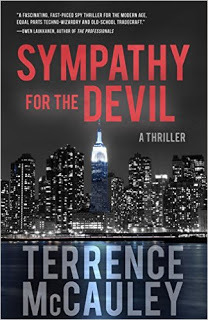
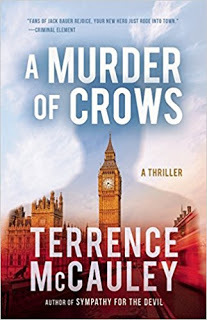 CLOAK AND DAGGER MAN ~ TERRENCE MCCAULEY
CLOAK AND DAGGER MAN ~ TERRENCE MCCAULEY
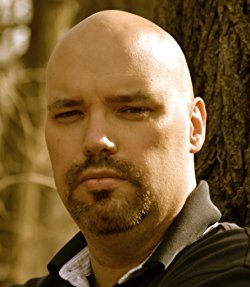 Award-winning writer of crime fiction and thrillers, Terrence McCauley’s novels of modern espionage have made the techno-thriller thrilling again. Lean, fast-paced, displaying sharp characterization, and eschewing all filler,
Sympathy For The Devil
,
A Murder Of Crows
, and the upcoming
A Conspiracy Of Ravens
(September 2017)—all featuring James Hicks and the machinations of the omnipotent University—are paranoia filled nightmares, stiletto slashes of modern espionage brought to life. In a clandestine meeting set up via dead drop, I recently debriefed Terrance about his world of spies and spying…********If we got our hands on the CIA file on Terrence McCauley what would it tell us about you? It would say that I was born in the Bronx and had the luxury of walking to school my entire life. Elementary school, high school and college (Fordham University) were all within walking distance of my apartment. It would also say I probably smoke too many cigars and yell at the television too much. How did the world of modern espionage intrigue you enough to choose it as a genre?
Award-winning writer of crime fiction and thrillers, Terrence McCauley’s novels of modern espionage have made the techno-thriller thrilling again. Lean, fast-paced, displaying sharp characterization, and eschewing all filler,
Sympathy For The Devil
,
A Murder Of Crows
, and the upcoming
A Conspiracy Of Ravens
(September 2017)—all featuring James Hicks and the machinations of the omnipotent University—are paranoia filled nightmares, stiletto slashes of modern espionage brought to life. In a clandestine meeting set up via dead drop, I recently debriefed Terrance about his world of spies and spying…********If we got our hands on the CIA file on Terrence McCauley what would it tell us about you? It would say that I was born in the Bronx and had the luxury of walking to school my entire life. Elementary school, high school and college (Fordham University) were all within walking distance of my apartment. It would also say I probably smoke too many cigars and yell at the television too much. How did the world of modern espionage intrigue you enough to choose it as a genre?
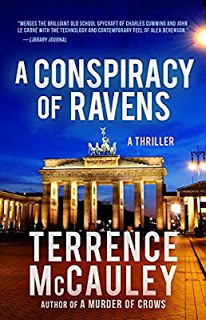 The first movie I ever watched with my father from start to finish was Three Days of the Condor. It’s a dense movie and tough to follow, even now, but I was about six or seven when I sat through it. We didn’t have cable, so I watched it with commercials, which made it even longer. I may not have understood it all at first, but the subtle aspects of the story intrigued me, even from an early age. I also watched The Equalizer when it was on TV and found myself more interested at the events they hinted at in McCall’s past as a spy than I was about his efforts to help people. As an adult, I’ve come to love the genre beyond just the James Bond movies and novels, and decided to try my hand at it. The result was Sympathy For The Devil, which received a lot of nice acclaim. How do you compare old school spies with modern espionage in real life and fiction? I think the spy genre is like the western genre, in that we use both genres to reflect where we are as a society. Bond came along at the beginning of the space race, so everyone was intrigued by the ideas of gadgets and technology. Those can be crutches for a writer. You can swing the other way and look at the great Le Carré, whose novels are beautifully written, but incredibly dense to the point where it’s difficult for many casual fans of the genre to follow along. Those of us who stuck with his work were richly rewarded with some wonderful books. Today, ex-Special Forces operators are the heroes. They’ve been written about extensively by other writers, so I decided to tell my story in my own way with my own kind of hero. In real life, espionage and intelligence have always been about one thing—finding out what your enemy doesn’t want you to know. And despite all of our advances with electronics and satellites and computers, the human element is always the weakest link in the chain. See Snowden, Assange and Bradley for details. The bells and whistles might get fancier, but nothing’s more reliable—or more corruptible—than the human element of espionage. What are the difficulties in writing cutting edge espionage fiction?
The first movie I ever watched with my father from start to finish was Three Days of the Condor. It’s a dense movie and tough to follow, even now, but I was about six or seven when I sat through it. We didn’t have cable, so I watched it with commercials, which made it even longer. I may not have understood it all at first, but the subtle aspects of the story intrigued me, even from an early age. I also watched The Equalizer when it was on TV and found myself more interested at the events they hinted at in McCall’s past as a spy than I was about his efforts to help people. As an adult, I’ve come to love the genre beyond just the James Bond movies and novels, and decided to try my hand at it. The result was Sympathy For The Devil, which received a lot of nice acclaim. How do you compare old school spies with modern espionage in real life and fiction? I think the spy genre is like the western genre, in that we use both genres to reflect where we are as a society. Bond came along at the beginning of the space race, so everyone was intrigued by the ideas of gadgets and technology. Those can be crutches for a writer. You can swing the other way and look at the great Le Carré, whose novels are beautifully written, but incredibly dense to the point where it’s difficult for many casual fans of the genre to follow along. Those of us who stuck with his work were richly rewarded with some wonderful books. Today, ex-Special Forces operators are the heroes. They’ve been written about extensively by other writers, so I decided to tell my story in my own way with my own kind of hero. In real life, espionage and intelligence have always been about one thing—finding out what your enemy doesn’t want you to know. And despite all of our advances with electronics and satellites and computers, the human element is always the weakest link in the chain. See Snowden, Assange and Bradley for details. The bells and whistles might get fancier, but nothing’s more reliable—or more corruptible—than the human element of espionage. What are the difficulties in writing cutting edge espionage fiction?
 I’m a news junkie, so when I started writing Sympathy For The Devil, I had the benefit of all the information Edward Snowden had released. I used some of what I’d learned and made logical leaps in the kind of technology I used in my book. It’s a strategy I’ve used since and plan on continuing to use well into the future. The greatest challenge is trying to be too cutting edge. If the tech isn’t relatable, people tend to tune out and either skip it or move on to another book. There have been advances in artificial intelligence and biometrics and the like that I mention in my novels, but I don’t plan on making much of them. My goal is to tell as interesting a story as I can, and people tend to gloss over large blocks of techno-babble. At least I know I do. It’s why I stopped reading Clancy’s work. I got tired of having to flip to the front of the book to remember what all the initials meant. Keep it simple for the audience to stay with you and the reader and the writer are better off. How do you balance character and technology in the modern spy novel? For me, it’s all about character. Bytes and satellites are only as interesting as the people who use them in the story. The trick is to use the technology to advance the story and keep the reader interested in the plot. When technology begins to be intrusive and does the work for the characters, the writer is in trouble. I have a lot of tech in my books, but it doesn’t supplant the plot or the main thrust of the story. If anything, I use it to enhance the traits of my characters. How do you keep your espionage novel rooted in the real world and not spinning off into the world of James Bond style supervillains, super weapons, and menacing henchmen?
I’m a news junkie, so when I started writing Sympathy For The Devil, I had the benefit of all the information Edward Snowden had released. I used some of what I’d learned and made logical leaps in the kind of technology I used in my book. It’s a strategy I’ve used since and plan on continuing to use well into the future. The greatest challenge is trying to be too cutting edge. If the tech isn’t relatable, people tend to tune out and either skip it or move on to another book. There have been advances in artificial intelligence and biometrics and the like that I mention in my novels, but I don’t plan on making much of them. My goal is to tell as interesting a story as I can, and people tend to gloss over large blocks of techno-babble. At least I know I do. It’s why I stopped reading Clancy’s work. I got tired of having to flip to the front of the book to remember what all the initials meant. Keep it simple for the audience to stay with you and the reader and the writer are better off. How do you balance character and technology in the modern spy novel? For me, it’s all about character. Bytes and satellites are only as interesting as the people who use them in the story. The trick is to use the technology to advance the story and keep the reader interested in the plot. When technology begins to be intrusive and does the work for the characters, the writer is in trouble. I have a lot of tech in my books, but it doesn’t supplant the plot or the main thrust of the story. If anything, I use it to enhance the traits of my characters. How do you keep your espionage novel rooted in the real world and not spinning off into the world of James Bond style supervillains, super weapons, and menacing henchmen?
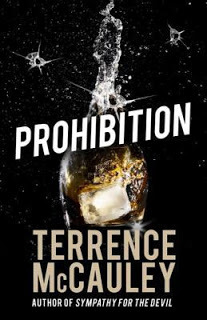 I love writing about people. All kinds of people. Good and bad and indifferent people. I keep in mind those on both sides of the struggle in my book were people first. They have pasts and motivations and experiences that brought them to where they are today. I’ve read a lot of books in the genre so I try to avoid copying some of the more common aspects of other works, like the ex-Special Forces operative pulled back into the life against his will, or the foaming Jihadist, or the corrupt, cigar-smoking senator more interested in money than his country. I do my best to keep the characters as real as possible because those are the kinds of books I like to read myself. Have you become paranoid researching all the surveillance and invasion of privacy techniques you write about? Nope. I’ve never been under the illusion we’ve ever had privacy in anything we do, and that was before the internet and cell phones. The government was able to tap telegraph lines, so today there should be no expectation of privacy. Maybe someone is keeping track of what I write and what I look up. If they are, I hope they enjoy what they read—and buy a book if they do. If I wind up in an orange jumpsuit in Gitmo, I’ll give you a call. Do you have any specific espionage fiction influences? Marc Cameron and Le Carré are two different types of writers who excel in their respective areas of espionage. The action in Cameron’s work is fantastic, while the plotting in Le Care’s work is admirable. I also like Daniel Silva’s books and Len Deighton’s rare talent for being able to tell a great story while introducing just the right amount of humor is fantastic.
I love writing about people. All kinds of people. Good and bad and indifferent people. I keep in mind those on both sides of the struggle in my book were people first. They have pasts and motivations and experiences that brought them to where they are today. I’ve read a lot of books in the genre so I try to avoid copying some of the more common aspects of other works, like the ex-Special Forces operative pulled back into the life against his will, or the foaming Jihadist, or the corrupt, cigar-smoking senator more interested in money than his country. I do my best to keep the characters as real as possible because those are the kinds of books I like to read myself. Have you become paranoid researching all the surveillance and invasion of privacy techniques you write about? Nope. I’ve never been under the illusion we’ve ever had privacy in anything we do, and that was before the internet and cell phones. The government was able to tap telegraph lines, so today there should be no expectation of privacy. Maybe someone is keeping track of what I write and what I look up. If they are, I hope they enjoy what they read—and buy a book if they do. If I wind up in an orange jumpsuit in Gitmo, I’ll give you a call. Do you have any specific espionage fiction influences? Marc Cameron and Le Carré are two different types of writers who excel in their respective areas of espionage. The action in Cameron’s work is fantastic, while the plotting in Le Care’s work is admirable. I also like Daniel Silva’s books and Len Deighton’s rare talent for being able to tell a great story while introducing just the right amount of humor is fantastic.
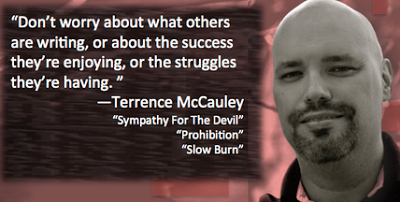 Do you actively seek out and collect espionage related or plot related threads you keep in a dead drop for when you might need them? Like I said, I’m a news junkie, but espionage and techno-thriller bits of news always grab my attention. I don’t take notes very often, but some of the facts tend to stick in my mind as I go along. They form a kernel of an idea, which often blows up into a plot for a short story or, if I’m lucky, a novel. What drove you to begin writing and what were your original goals?
Do you actively seek out and collect espionage related or plot related threads you keep in a dead drop for when you might need them? Like I said, I’m a news junkie, but espionage and techno-thriller bits of news always grab my attention. I don’t take notes very often, but some of the facts tend to stick in my mind as I go along. They form a kernel of an idea, which often blows up into a plot for a short story or, if I’m lucky, a novel. What drove you to begin writing and what were your original goals?
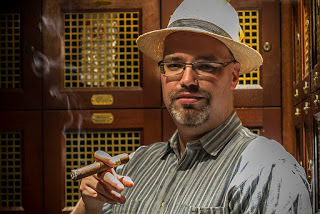 I began writing because I grew up in a family of storytellers. My uncles were priests in inner city parishes here in NYC, so they always had stories to tell. One uncle was actually a chaplain in Bedford Hills Correctional Facility for Women, so you can imagine some of the stuff he saw. I suppose it’s why I chose to write about crime, because from an early age, I was introduced to the failings of the human condition. Cops and robbers and spies help me tell the story of that condition without becoming too preachy about it. My original goals were to get published. I figured I had about one good book in me. That book was Prohibition, originally published by our good friends over at Airship 27. I never thought I’d write a sequel, much less begin The University Series. But I did and I’m still at it more than five years later. How have your writing and your goals changed with experience?
I began writing because I grew up in a family of storytellers. My uncles were priests in inner city parishes here in NYC, so they always had stories to tell. One uncle was actually a chaplain in Bedford Hills Correctional Facility for Women, so you can imagine some of the stuff he saw. I suppose it’s why I chose to write about crime, because from an early age, I was introduced to the failings of the human condition. Cops and robbers and spies help me tell the story of that condition without becoming too preachy about it. My original goals were to get published. I figured I had about one good book in me. That book was Prohibition, originally published by our good friends over at Airship 27. I never thought I’d write a sequel, much less begin The University Series. But I did and I’m still at it more than five years later. How have your writing and your goals changed with experience?
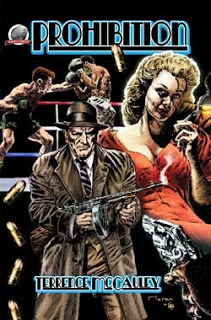 Yes. The more I’ve done it, the more important writing has become to me. It’s now part of who I am. When people ask me what I do for a living, I tell them I’m a writer, even though I have a day job that has nothing to do with writing. My goal now is to tell the best story I can, and never think I’m as good as I can be. There’s always room for improvement and I never want any of my readers to feel like I gave any less than my best. They might not like something I’ve written, but I never want them to be able to say it’s boring. Polis Books is a high profile, progressive, successful small publisher. How did you come into their universe and how has your journey with them progressed? I met Jason Pinter, the owner and publisher of Polis Books, at several Noir at the Bar events. After he launched Polis Books, I asked him if he was looking for any new material. He said he was looking for good material whether it was new or not. So, I sent him a list of the works I had done and planned to write and we agreed to a three book deal. We’re now on our third and fourth books together, with the possibility of more in the future. Like many authors, you’ve kept your day job while continuing to weave your stories in your off hours. What stresses does this schedule put on you personally, on your family, on your day job?
Yes. The more I’ve done it, the more important writing has become to me. It’s now part of who I am. When people ask me what I do for a living, I tell them I’m a writer, even though I have a day job that has nothing to do with writing. My goal now is to tell the best story I can, and never think I’m as good as I can be. There’s always room for improvement and I never want any of my readers to feel like I gave any less than my best. They might not like something I’ve written, but I never want them to be able to say it’s boring. Polis Books is a high profile, progressive, successful small publisher. How did you come into their universe and how has your journey with them progressed? I met Jason Pinter, the owner and publisher of Polis Books, at several Noir at the Bar events. After he launched Polis Books, I asked him if he was looking for any new material. He said he was looking for good material whether it was new or not. So, I sent him a list of the works I had done and planned to write and we agreed to a three book deal. We’re now on our third and fourth books together, with the possibility of more in the future. Like many authors, you’ve kept your day job while continuing to weave your stories in your off hours. What stresses does this schedule put on you personally, on your family, on your day job?
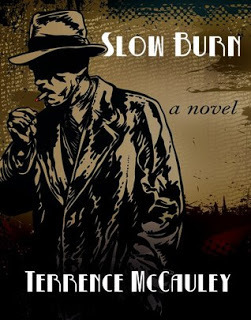 It helps that I don’t have a ton of hobbies. I don’t like to golf. I love traveling and reading and watching old movies and documentaries. I enjoy strong coffee and cigars, both of which I can enjoy while writing. Everything I do outside the office lends itself to help me in my craft. Even when I’m not physically at the keyboard working on a novel, I’m thinking about what’s coming next. Some people think that’s taxing, but I couldn’t live any other way. Nor would I want to. The stresses of being a full-time writer can also be onerous. A writer’s income fluctuates wildly. Benefits, pensions, and medical coverage become a mirage. Writing full time increases the pressure to produce good work exponentially. Sitting around in your pajamas all day playing with your imaginary friends may sound like fun, but it isn’t the reality of a writer’s life. Is your plan to become a full-time writer and, if so, how will you deal with those challenges? I’d love nothing more than to have the opportunity to take that challenge, but I’ll only do it if I was fortunate enough to do it my way. I’d need enough money in the bank to secure my financial future before I’d consider quitting my job and writing full time. It’s hard to hear the muse over the growl of an empty stomach. It’s also tough to type on a computer when the electricity gets shut off. I also don’t know if I could write with a gun to my head. I’ve always worked fast, but it’s been on my own terms and largely at my leisure. I’ve often wondered if the stress level of finding good paying gigs would affect my writing. I’m sure it would. I just don’t know if it would make it better or worse. So yes, I’d need to have a significant amount in the bank or some kind of security to feel comfortable enough to dive into this full time. How much? Make me an offer and find out! What’s next for Mr. Hicks and the University, and what else do you have hidden up your sleeve?
It helps that I don’t have a ton of hobbies. I don’t like to golf. I love traveling and reading and watching old movies and documentaries. I enjoy strong coffee and cigars, both of which I can enjoy while writing. Everything I do outside the office lends itself to help me in my craft. Even when I’m not physically at the keyboard working on a novel, I’m thinking about what’s coming next. Some people think that’s taxing, but I couldn’t live any other way. Nor would I want to. The stresses of being a full-time writer can also be onerous. A writer’s income fluctuates wildly. Benefits, pensions, and medical coverage become a mirage. Writing full time increases the pressure to produce good work exponentially. Sitting around in your pajamas all day playing with your imaginary friends may sound like fun, but it isn’t the reality of a writer’s life. Is your plan to become a full-time writer and, if so, how will you deal with those challenges? I’d love nothing more than to have the opportunity to take that challenge, but I’ll only do it if I was fortunate enough to do it my way. I’d need enough money in the bank to secure my financial future before I’d consider quitting my job and writing full time. It’s hard to hear the muse over the growl of an empty stomach. It’s also tough to type on a computer when the electricity gets shut off. I also don’t know if I could write with a gun to my head. I’ve always worked fast, but it’s been on my own terms and largely at my leisure. I’ve often wondered if the stress level of finding good paying gigs would affect my writing. I’m sure it would. I just don’t know if it would make it better or worse. So yes, I’d need to have a significant amount in the bank or some kind of security to feel comfortable enough to dive into this full time. How much? Make me an offer and find out! What’s next for Mr. Hicks and the University, and what else do you have hidden up your sleeve?
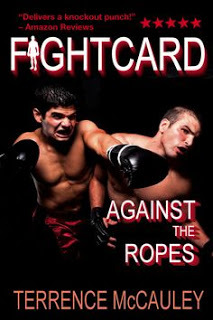 The University Series is growing more and more each year. It’s not just about Hicks and the first three books are not a trilogy. Nothing is over. In fact, everything is just beginning. Next year, Polis will be publishing the sequel to my 1930s novel Slow Burn, called The Fairfax Incident. It is the book that shows the very beginning of how The University was formed in the pre-World War II era and blossomed into the entity it is today. I also have plenty of huge changes in store following the events of A Conspiracy Of Ravens. Stay tuned.********As Terrence makes his way back out into the cold, I want to thank him for taking the time to chat and share his writing experiences with us. TO FIND OUT MORE CLICK HERE
The University Series is growing more and more each year. It’s not just about Hicks and the first three books are not a trilogy. Nothing is over. In fact, everything is just beginning. Next year, Polis will be publishing the sequel to my 1930s novel Slow Burn, called The Fairfax Incident. It is the book that shows the very beginning of how The University was formed in the pre-World War II era and blossomed into the entity it is today. I also have plenty of huge changes in store following the events of A Conspiracy Of Ravens. Stay tuned.********As Terrence makes his way back out into the cold, I want to thank him for taking the time to chat and share his writing experiences with us. TO FIND OUT MORE CLICK HERE
Published on May 12, 2017 16:39
May 8, 2017
THE MOJO MAN ~ STEPHEN MERTZ
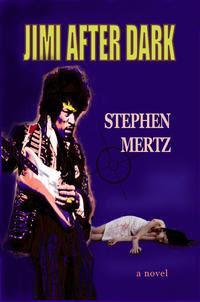
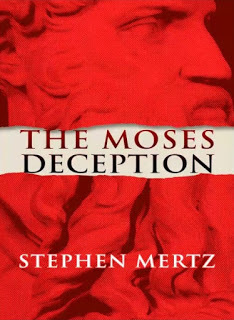 THE MOJO MAN ~ STEPHEN MERTZ
THE MOJO MAN ~ STEPHEN MERTZ
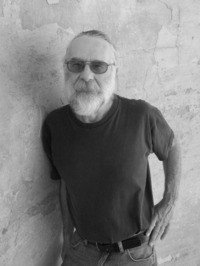 Full disclosure up front. Stephen Mojo Mertz and I have been friends since our early days of mystery fanzines. We both broke into professional fiction writing in the mid-eighties, both in (different) men’s adventure series paperbacks published under pseudonyms. Since those days, we’ve continued our friendship through years of publishing successes under our own names, mystery conventions, and marathon used bookstore crawls. We’ve also been through the proverbial hell and high water of being poorly treated as mid-list writers by the major New York legacy publishers who were once the gatekeepers of bestsellerdom. We’ve also been part of the e-book revolution breaking free from those legacy publishers and working with the new breed of smaller independent publishers. ********What information would be on your author’s job application? Good upbringing. Military Service. Free thinker. Devilishly handsome. Unbelievably intelligent. Not to be trifled with. Before we dig into your writing, what should we know about the history of Mojo Mertz the musician?
Full disclosure up front. Stephen Mojo Mertz and I have been friends since our early days of mystery fanzines. We both broke into professional fiction writing in the mid-eighties, both in (different) men’s adventure series paperbacks published under pseudonyms. Since those days, we’ve continued our friendship through years of publishing successes under our own names, mystery conventions, and marathon used bookstore crawls. We’ve also been through the proverbial hell and high water of being poorly treated as mid-list writers by the major New York legacy publishers who were once the gatekeepers of bestsellerdom. We’ve also been part of the e-book revolution breaking free from those legacy publishers and working with the new breed of smaller independent publishers. ********What information would be on your author’s job application? Good upbringing. Military Service. Free thinker. Devilishly handsome. Unbelievably intelligent. Not to be trifled with. Before we dig into your writing, what should we know about the history of Mojo Mertz the musician?
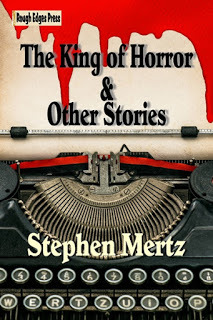 I've played in bars, clubs, and taverns from the Mississippi west and from Canadadown to Mexico. A lot of one-nighters, a lot of time on the road, but a long time ago. Never made it to the big time. Once I realized I could make money sitting at a keyboard, typing, it made more sense than bad food, bad lodgings and social disease. So I made the switch from music to writing. What came first, the treble clef or the word stacking? Well, if we were to drop in on a 16-year-old Stephen Mertz, he would probably be spending all of his free time either listening to The Rolling Stones, Chuck Berry, and Bo Diddley or reading Dashiell Hammett, Raymond Chandler and Mickey Spillane. How has music influenced your writing? The energy level! For years when I was writing pulp fiction, I didn't have pictures of great novelists on the wall. Directly over my desk I had a photograph of Chuck Berry doing the duck walk because I was trying to get the energy and the vibrancy of his music into what I was writing. Now I think about it, these days I have a picture of Howlin’ Wolf rockin’ out over my desk. So, I guess I still try to draw from the same cross pollination when I write. Your new novel, Jimi After Dark, is not so much a sequel to Hank and Muddy as a loosely connected companion piece. What can you reveal about the book and what it means to you as a writer?
I've played in bars, clubs, and taverns from the Mississippi west and from Canadadown to Mexico. A lot of one-nighters, a lot of time on the road, but a long time ago. Never made it to the big time. Once I realized I could make money sitting at a keyboard, typing, it made more sense than bad food, bad lodgings and social disease. So I made the switch from music to writing. What came first, the treble clef or the word stacking? Well, if we were to drop in on a 16-year-old Stephen Mertz, he would probably be spending all of his free time either listening to The Rolling Stones, Chuck Berry, and Bo Diddley or reading Dashiell Hammett, Raymond Chandler and Mickey Spillane. How has music influenced your writing? The energy level! For years when I was writing pulp fiction, I didn't have pictures of great novelists on the wall. Directly over my desk I had a photograph of Chuck Berry doing the duck walk because I was trying to get the energy and the vibrancy of his music into what I was writing. Now I think about it, these days I have a picture of Howlin’ Wolf rockin’ out over my desk. So, I guess I still try to draw from the same cross pollination when I write. Your new novel, Jimi After Dark, is not so much a sequel to Hank and Muddy as a loosely connected companion piece. What can you reveal about the book and what it means to you as a writer?
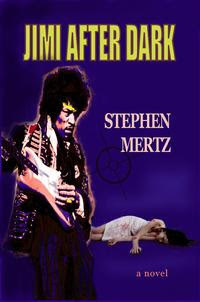 Jimi After Dark is my ‘60s novel. I guess every writer of my generation has at least one in him or her. It’s a look at my generation at a time when the world was opening before us, people in our 20s. But there was a war going on. About half of the guys in my generation were hanging out, on the job or on college campuses, smoking pot and listening to Jimi Hendrix. An equal number of young men of the same age were in Viet Nam smoking pot, listening to Jimi Hendrix, and killing or being killed. That is a pretty dramatic divide.
Jimi After Dark is my ‘60s novel. I guess every writer of my generation has at least one in him or her. It’s a look at my generation at a time when the world was opening before us, people in our 20s. But there was a war going on. About half of the guys in my generation were hanging out, on the job or on college campuses, smoking pot and listening to Jimi Hendrix. An equal number of young men of the same age were in Viet Nam smoking pot, listening to Jimi Hendrix, and killing or being killed. That is a pretty dramatic divide.
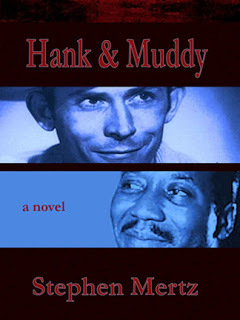 Yes, this is one of a sequence of books I hope to write which looks at the American Experience through the lens of the people of who were making the popular music of the time. Hank and Muddy offered me the opportunity to get into everything from the blues to country western music to racism to sexual mores, and it is the same with Jimi After Dark. I was in Londonthree times as a US Serviceman on leave between 1967–1968, and I soaked up my share of impressions that went into the book. Hell, I lost my cherry on one of those trips! I managed to spend most of the rest of my time prowling bookshops and nightclubs and hearing bands like Ten Years After and Peter Green's Fleetwood Mac when they were still playing the clubs scene. A lot of those impressions went into the book.
Yes, this is one of a sequence of books I hope to write which looks at the American Experience through the lens of the people of who were making the popular music of the time. Hank and Muddy offered me the opportunity to get into everything from the blues to country western music to racism to sexual mores, and it is the same with Jimi After Dark. I was in Londonthree times as a US Serviceman on leave between 1967–1968, and I soaked up my share of impressions that went into the book. Hell, I lost my cherry on one of those trips! I managed to spend most of the rest of my time prowling bookshops and nightclubs and hearing bands like Ten Years After and Peter Green's Fleetwood Mac when they were still playing the clubs scene. A lot of those impressions went into the book.
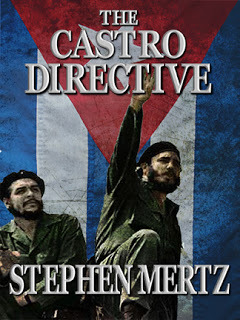 Will there be another companion novel to form a trilogy of musically based stories? Yes. You also have a new thriller, The Moses Deception, making its debut. How is it different from Jimi After Dark? Jimi After Dark and The Moses Deception are quite different novels, which I'm proud of as they showcase my range. Jimi would make a great tight little kick-ass black and white or stylish crime film while the Moses book is a widescreen 70mm thriller. Was the writing process or mindset different between the two books and, if so, how?
Will there be another companion novel to form a trilogy of musically based stories? Yes. You also have a new thriller, The Moses Deception, making its debut. How is it different from Jimi After Dark? Jimi After Dark and The Moses Deception are quite different novels, which I'm proud of as they showcase my range. Jimi would make a great tight little kick-ass black and white or stylish crime film while the Moses book is a widescreen 70mm thriller. Was the writing process or mindset different between the two books and, if so, how?
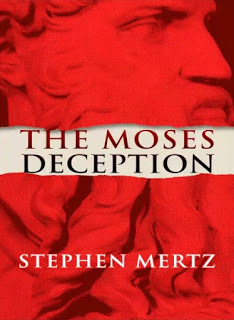 The Jimi book is largely written in first person, so the dramatic effect is more centralized, being channeled through this one guy’s perspective. It’s why first person is so often used in suspense fiction—and Young Adult novels, for that matter. You really get to know the protagonist with first person. The hero of Jimi After Dark is a tough guy known only as Soldier, and he had no problem dominating the story he’s telling. The Moses Deception, on the other hand, is painted on a far broader canvas with many characters...including Moses, I might add. With so many characters and perspectives contributing to the big picture, it would have been unfair to focus on just one, so it’s written in third person in order to convey the full scope. What is your process when beginning a new book? Is it different for different books?
The Jimi book is largely written in first person, so the dramatic effect is more centralized, being channeled through this one guy’s perspective. It’s why first person is so often used in suspense fiction—and Young Adult novels, for that matter. You really get to know the protagonist with first person. The hero of Jimi After Dark is a tough guy known only as Soldier, and he had no problem dominating the story he’s telling. The Moses Deception, on the other hand, is painted on a far broader canvas with many characters...including Moses, I might add. With so many characters and perspectives contributing to the big picture, it would have been unfair to focus on just one, so it’s written in third person in order to convey the full scope. What is your process when beginning a new book? Is it different for different books?
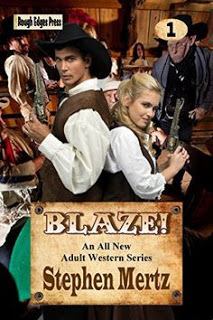 The process is pretty much the same. A lot of walking around and thinking and making notes. Having people call me Easy Money when I am working my ass off because it looks like I am just staring at the clouds. After about a month of that, I open the flood gates and let it come out. Once the writing begins, I shoot for one thousand words a day. By the time the book is going off to the publisher, it has probably been through 3-4 drafts. What was the last novel to make you laugh? You know, I forget the title. It was a Spenser novel by Robert B. Parker, a clever guy. I grinned on almost every page. What was the last novel to make you cry? I save my tears for real life and the occasional country song. What makes books important to you?
The process is pretty much the same. A lot of walking around and thinking and making notes. Having people call me Easy Money when I am working my ass off because it looks like I am just staring at the clouds. After about a month of that, I open the flood gates and let it come out. Once the writing begins, I shoot for one thousand words a day. By the time the book is going off to the publisher, it has probably been through 3-4 drafts. What was the last novel to make you laugh? You know, I forget the title. It was a Spenser novel by Robert B. Parker, a clever guy. I grinned on almost every page. What was the last novel to make you cry? I save my tears for real life and the occasional country song. What makes books important to you?
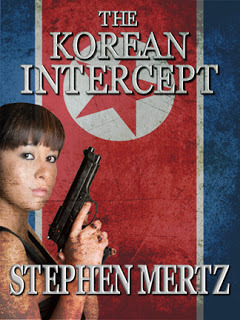 Unless you remember the cigarette ads they were putting in paperbacks back in the day, books don't have commercials! They give you the story and the characters, but they leave it to you to experience both. It seems so less passive than visual mediums. I love movies, but with a book, you are off in a corner by yourself in your little part of the world and no one is messing with you. In a book and you can be in any universe of your choice, experiencing any adventure you want to experience, gaining any knowledge and wisdom you may care to gain. Books rule! You are a collector and a first class bookstore scavenger. Who are the authors you love to read and who you do you keep on your personal bookshelves? Don't get me started! It’s really hard to hone in on anyone. I just love to read. Sooner or later I always go back and read Louis L’Amour. I always go back and read Dashiell Hammett. I always go back and read Mickey Spillane. But, as you say, I have been scavenging and reading for a long time. With so many friends who are writers, I try to keep up with their work, keep up with those who are defining today's taste on the bestseller lists, and of course those old favorites who I go back and revisit. You are often asked to talk about writing to many different groups. What advice do you share and what do you think has the most impact?
Unless you remember the cigarette ads they were putting in paperbacks back in the day, books don't have commercials! They give you the story and the characters, but they leave it to you to experience both. It seems so less passive than visual mediums. I love movies, but with a book, you are off in a corner by yourself in your little part of the world and no one is messing with you. In a book and you can be in any universe of your choice, experiencing any adventure you want to experience, gaining any knowledge and wisdom you may care to gain. Books rule! You are a collector and a first class bookstore scavenger. Who are the authors you love to read and who you do you keep on your personal bookshelves? Don't get me started! It’s really hard to hone in on anyone. I just love to read. Sooner or later I always go back and read Louis L’Amour. I always go back and read Dashiell Hammett. I always go back and read Mickey Spillane. But, as you say, I have been scavenging and reading for a long time. With so many friends who are writers, I try to keep up with their work, keep up with those who are defining today's taste on the bestseller lists, and of course those old favorites who I go back and revisit. You are often asked to talk about writing to many different groups. What advice do you share and what do you think has the most impact?
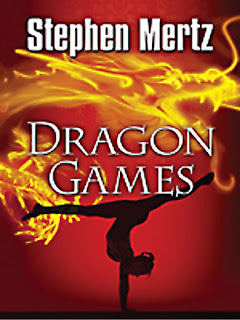 Some of the advice I give, they get everywhere from everyone: Just do it. Write one page a day. Read a lot to see how it is done. The best advice I think I have been able to give, that has resonated, is to try in your writing to get rid of any division between your life—who you are and what you are doing day-by-day—and what you are writing about. By that I mean, you might be writing about people on Mars, or you might be writing about people in the 11th Century, but they are people. They have all the elements and aspects of human nature we have internally, shaped by whatever society or culture they are in. But inside they have the same conversations rambling endlessly between their ears—regrets, goals, and so on—we have in our lives. Unpublished writers of fiction often tend to think the world they’re writing about is somehow different than the world they’re living in. I try to get them to realize when it comes to characterization, there is no difference. When you decide to write a novel, do you take the market into consideration or do you follow the muse?
Some of the advice I give, they get everywhere from everyone: Just do it. Write one page a day. Read a lot to see how it is done. The best advice I think I have been able to give, that has resonated, is to try in your writing to get rid of any division between your life—who you are and what you are doing day-by-day—and what you are writing about. By that I mean, you might be writing about people on Mars, or you might be writing about people in the 11th Century, but they are people. They have all the elements and aspects of human nature we have internally, shaped by whatever society or culture they are in. But inside they have the same conversations rambling endlessly between their ears—regrets, goals, and so on—we have in our lives. Unpublished writers of fiction often tend to think the world they’re writing about is somehow different than the world they’re living in. I try to get them to realize when it comes to characterization, there is no difference. When you decide to write a novel, do you take the market into consideration or do you follow the muse?
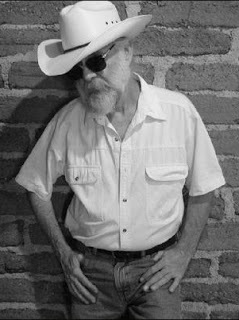 I very much considered markets in the beginning to get a toe hold in the business. It’s why so many new writers grab onto genres. I did. Earning while you learn by writing stories with recognizable tropes and markets is a time tested way of getting started. But after a while—well, for the past two decades—I’ve just written stories I felt should be told. I write the book and thentry to sell it. So far, so good. Happily, I love the western field and the thriller field, so there’s been a market for everything I’ve written…so far! I only write novels I feel need to be written. The trick, of course, is adhering to the recognizable tropes of a genre while striving to craft scenes which appear to never have been written before.********Thx to Steve for braving the lights of the interrogation room and sharing his experienced perspective on books, music, and his writing process...Be sure to check out his current releases—the rockin’ Jimi After Dark, and his high-concept thriller, The Moses Deception...
I very much considered markets in the beginning to get a toe hold in the business. It’s why so many new writers grab onto genres. I did. Earning while you learn by writing stories with recognizable tropes and markets is a time tested way of getting started. But after a while—well, for the past two decades—I’ve just written stories I felt should be told. I write the book and thentry to sell it. So far, so good. Happily, I love the western field and the thriller field, so there’s been a market for everything I’ve written…so far! I only write novels I feel need to be written. The trick, of course, is adhering to the recognizable tropes of a genre while striving to craft scenes which appear to never have been written before.********Thx to Steve for braving the lights of the interrogation room and sharing his experienced perspective on books, music, and his writing process...Be sure to check out his current releases—the rockin’ Jimi After Dark, and his high-concept thriller, The Moses Deception...FIND OUT MORE ABOUT STEVE'S BOOKS CLICK HERE
Published on May 08, 2017 18:37
IN THE INTERROGATION ROOM: STEPHEN MERTZ

 IN THE INTEROGATION ROOM: STEPHEN MERTZ
IN THE INTEROGATION ROOM: STEPHEN MERTZ
 Full disclosure up front. Stephen Mojo Mertz and I have been friends since our early days of mystery fanzines. We both broke into professional fiction writing in the mid-eighties, both in (different) men’s adventure series paperbacks published under pseudonyms. Since those days, we’ve continued our friendship through years of publishing successes under our own names, mystery conventions, and marathon used bookstore crawls. We’ve also been through the proverbial hell and high water of being poorly treated as mid-list writers by the major New York legacy publishers who were once the gatekeepers of bestsellerdom. We’ve also been part of the e-book revolution breaking free from those legacy publishers and working with the new breed of smaller independent publishers. ********What information would be on your author’s job application? Good upbringing. Military Service. Free thinker. Devilishly handsome. Unbelievably intelligent. Not to be trifled with. Before we dig into your writing, what should we know about the history of Mojo Mertz the musician?
Full disclosure up front. Stephen Mojo Mertz and I have been friends since our early days of mystery fanzines. We both broke into professional fiction writing in the mid-eighties, both in (different) men’s adventure series paperbacks published under pseudonyms. Since those days, we’ve continued our friendship through years of publishing successes under our own names, mystery conventions, and marathon used bookstore crawls. We’ve also been through the proverbial hell and high water of being poorly treated as mid-list writers by the major New York legacy publishers who were once the gatekeepers of bestsellerdom. We’ve also been part of the e-book revolution breaking free from those legacy publishers and working with the new breed of smaller independent publishers. ********What information would be on your author’s job application? Good upbringing. Military Service. Free thinker. Devilishly handsome. Unbelievably intelligent. Not to be trifled with. Before we dig into your writing, what should we know about the history of Mojo Mertz the musician?
 I've played in bars, clubs, and taverns from the Mississippi west and from Canadadown to Mexico. A lot of one-nighters, a lot of time on the road, but a long time ago. Never made it to the big time. Once I realized I could make money sitting at a keyboard, typing, it made more sense than bad food, bad lodgings and social disease. So I made the switch from music to writing. What came first, the treble clef or the word stacking? Well, if we were to drop in on a 16-year-old Stephen Mertz, he would probably be spending all of his free time either listening to The Rolling Stones, Chuck Berry, and Bo Diddley or reading Dashiell Hammett, Raymond Chandler and Mickey Spillane. How has music influenced your writing? The energy level! For years when I was writing pulp fiction, I didn't have pictures of great novelists on the wall. Directly over my desk I had a photograph of Chuck Berry doing the duck walk because I was trying to get the energy and the vibrancy of his music into what I was writing. Now I think about it, these days I have a picture of Howlin’ Wolf rockin’ out over my desk. So, I guess I still try to draw from the same cross pollination when I write. Your new novel, Jimi After Dark, is not so much a sequel to Hank and Muddy as a loosely connected companion piece. What can you reveal about the book and what it means to you as a writer?
I've played in bars, clubs, and taverns from the Mississippi west and from Canadadown to Mexico. A lot of one-nighters, a lot of time on the road, but a long time ago. Never made it to the big time. Once I realized I could make money sitting at a keyboard, typing, it made more sense than bad food, bad lodgings and social disease. So I made the switch from music to writing. What came first, the treble clef or the word stacking? Well, if we were to drop in on a 16-year-old Stephen Mertz, he would probably be spending all of his free time either listening to The Rolling Stones, Chuck Berry, and Bo Diddley or reading Dashiell Hammett, Raymond Chandler and Mickey Spillane. How has music influenced your writing? The energy level! For years when I was writing pulp fiction, I didn't have pictures of great novelists on the wall. Directly over my desk I had a photograph of Chuck Berry doing the duck walk because I was trying to get the energy and the vibrancy of his music into what I was writing. Now I think about it, these days I have a picture of Howlin’ Wolf rockin’ out over my desk. So, I guess I still try to draw from the same cross pollination when I write. Your new novel, Jimi After Dark, is not so much a sequel to Hank and Muddy as a loosely connected companion piece. What can you reveal about the book and what it means to you as a writer?
 Jimi After Dark is my ‘60s novel. I guess every writer of my generation has at least one in him or her. It’s a look at my generation at a time when the world was opening before us, people in our 20s. But there was a war going on. About half of the guys in my generation were hanging out, on the job or on college campuses, smoking pot and listening to Jimi Hendrix. An equal number of young men of the same age were in Viet Nam smoking pot, listening to Jimi Hendrix, and killing or being killed. That is a pretty dramatic divide.
Jimi After Dark is my ‘60s novel. I guess every writer of my generation has at least one in him or her. It’s a look at my generation at a time when the world was opening before us, people in our 20s. But there was a war going on. About half of the guys in my generation were hanging out, on the job or on college campuses, smoking pot and listening to Jimi Hendrix. An equal number of young men of the same age were in Viet Nam smoking pot, listening to Jimi Hendrix, and killing or being killed. That is a pretty dramatic divide.
 Yes, this is one of a sequence of books I hope to write which looks at the American Experience through the lens of the people of who were making the popular music of the time. Hank and Muddy offered me the opportunity to get into everything from the blues to country western music to racism to sexual mores, and it is the same with Jimi After Dark. I was in Londonthree times as a US Serviceman on leave between 1967–1968, and I soaked up my share of impressions that went into the book. Hell, I lost my cherry on one of those trips! I managed to spend most of the rest of my time prowling bookshops and nightclubs and hearing bands like Ten Years After and Peter Green's Fleetwood Mac when they were still playing the clubs scene. A lot of those impressions went into the book.
Yes, this is one of a sequence of books I hope to write which looks at the American Experience through the lens of the people of who were making the popular music of the time. Hank and Muddy offered me the opportunity to get into everything from the blues to country western music to racism to sexual mores, and it is the same with Jimi After Dark. I was in Londonthree times as a US Serviceman on leave between 1967–1968, and I soaked up my share of impressions that went into the book. Hell, I lost my cherry on one of those trips! I managed to spend most of the rest of my time prowling bookshops and nightclubs and hearing bands like Ten Years After and Peter Green's Fleetwood Mac when they were still playing the clubs scene. A lot of those impressions went into the book.
 Will there be another companion novel to form a trilogy of musically based stories? Yes. You also have a new thriller, The Moses Deception, making its debut. How is it different from Jimi After Dark? Jimi After Dark and The Moses Deception are quite different novels, which I'm proud of as they showcase my range. Jimi would make a great tight little kick-ass black and white or stylish crime film while the Moses book is a widescreen 70mm thriller. Was the writing process or mindset different between the two books and, if so, how?
Will there be another companion novel to form a trilogy of musically based stories? Yes. You also have a new thriller, The Moses Deception, making its debut. How is it different from Jimi After Dark? Jimi After Dark and The Moses Deception are quite different novels, which I'm proud of as they showcase my range. Jimi would make a great tight little kick-ass black and white or stylish crime film while the Moses book is a widescreen 70mm thriller. Was the writing process or mindset different between the two books and, if so, how?
 The Jimi book is largely written in first person, so the dramatic effect is more centralized, being channeled through this one guy’s perspective. It’s why first person is so often used in suspense fiction—and Young Adult novels, for that matter. You really get to know the protagonist with first person. The hero of Jimi After Dark is a tough guy known only as Soldier, and he had no problem dominating the story he’s telling. The Moses Deception, on the other hand, is painted on a far broader canvas with many characters...including Moses, I might add. With so many characters and perspectives contributing to the big picture, it would have been unfair to focus on just one, so it’s written in third person in order to convey the full scope. What is your process when beginning a new book? Is it different for different books?
The Jimi book is largely written in first person, so the dramatic effect is more centralized, being channeled through this one guy’s perspective. It’s why first person is so often used in suspense fiction—and Young Adult novels, for that matter. You really get to know the protagonist with first person. The hero of Jimi After Dark is a tough guy known only as Soldier, and he had no problem dominating the story he’s telling. The Moses Deception, on the other hand, is painted on a far broader canvas with many characters...including Moses, I might add. With so many characters and perspectives contributing to the big picture, it would have been unfair to focus on just one, so it’s written in third person in order to convey the full scope. What is your process when beginning a new book? Is it different for different books?
 The process is pretty much the same. A lot of walking around and thinking and making notes. Having people call me Easy Money when I am working my ass off because it looks like I am just staring at the clouds. After about a month of that, I open the flood gates and let it come out. Once the writing begins, I shoot for one thousand words a day. By the time the book is going off to the publisher, it has probably been through 3-4 drafts. What was the last novel to make you laugh? You know, I forget the title. It was a Spenser novel by Robert B. Parker, a clever guy. I grinned on almost every page. What was the last novel to make you cry? I save my tears for real life and the occasional country song. What makes books important to you?
The process is pretty much the same. A lot of walking around and thinking and making notes. Having people call me Easy Money when I am working my ass off because it looks like I am just staring at the clouds. After about a month of that, I open the flood gates and let it come out. Once the writing begins, I shoot for one thousand words a day. By the time the book is going off to the publisher, it has probably been through 3-4 drafts. What was the last novel to make you laugh? You know, I forget the title. It was a Spenser novel by Robert B. Parker, a clever guy. I grinned on almost every page. What was the last novel to make you cry? I save my tears for real life and the occasional country song. What makes books important to you?
 Unless you remember the cigarette ads they were putting in paperbacks back in the day, books don't have commercials! They give you the story and the characters, but they leave it to you to experience both. It seems so less passive than visual mediums. I love movies, but with a book, you are off in a corner by yourself in your little part of the world and no one is messing with you. In a book and you can be in any universe of your choice, experiencing any adventure you want to experience, gaining any knowledge and wisdom you may care to gain. Books rule! You are a collector and a first class bookstore scavenger. Who are the authors you love to read and who you do you keep on your personal bookshelves? Don't get me started! It’s really hard to hone in on anyone. I just love to read. Sooner or later I always go back and read Louis L’Amour. I always go back and read Dashiell Hammett. I always go back and read Mickey Spillane. But, as you say, I have been scavenging and reading for a long time. With so many friends who are writers, I try to keep up with their work, keep up with those who are defining today's taste on the bestseller lists, and of course those old favorites who I go back and revisit. You are often asked to talk about writing to many different groups. What advice do you share and what do you think has the most impact?
Unless you remember the cigarette ads they were putting in paperbacks back in the day, books don't have commercials! They give you the story and the characters, but they leave it to you to experience both. It seems so less passive than visual mediums. I love movies, but with a book, you are off in a corner by yourself in your little part of the world and no one is messing with you. In a book and you can be in any universe of your choice, experiencing any adventure you want to experience, gaining any knowledge and wisdom you may care to gain. Books rule! You are a collector and a first class bookstore scavenger. Who are the authors you love to read and who you do you keep on your personal bookshelves? Don't get me started! It’s really hard to hone in on anyone. I just love to read. Sooner or later I always go back and read Louis L’Amour. I always go back and read Dashiell Hammett. I always go back and read Mickey Spillane. But, as you say, I have been scavenging and reading for a long time. With so many friends who are writers, I try to keep up with their work, keep up with those who are defining today's taste on the bestseller lists, and of course those old favorites who I go back and revisit. You are often asked to talk about writing to many different groups. What advice do you share and what do you think has the most impact?
 Some of the advice I give, they get everywhere from everyone: Just do it. Write one page a day. Read a lot to see how it is done. The best advice I think I have been able to give, that has resonated, is to try in your writing to get rid of any division between your life—who you are and what you are doing day-by-day—and what you are writing about. By that I mean, you might be writing about people on Mars, or you might be writing about people in the 11th Century, but they are people. They have all the elements and aspects of human nature we have internally, shaped by whatever society or culture they are in. But inside they have the same conversations rambling endlessly between their ears—regrets, goals, and so on—we have in our lives. Unpublished writers of fiction often tend to think the world they’re writing about is somehow different than the world they’re living in. I try to get them to realize when it comes to characterization, there is no difference. When you decide to write a novel, do you take the market into consideration or do you follow the muse?
Some of the advice I give, they get everywhere from everyone: Just do it. Write one page a day. Read a lot to see how it is done. The best advice I think I have been able to give, that has resonated, is to try in your writing to get rid of any division between your life—who you are and what you are doing day-by-day—and what you are writing about. By that I mean, you might be writing about people on Mars, or you might be writing about people in the 11th Century, but they are people. They have all the elements and aspects of human nature we have internally, shaped by whatever society or culture they are in. But inside they have the same conversations rambling endlessly between their ears—regrets, goals, and so on—we have in our lives. Unpublished writers of fiction often tend to think the world they’re writing about is somehow different than the world they’re living in. I try to get them to realize when it comes to characterization, there is no difference. When you decide to write a novel, do you take the market into consideration or do you follow the muse?
 I very much considered markets in the beginning to get a toe hold in the business. It’s why so many new writers grab onto genres. I did. Earning while you learn by writing stories with recognizable tropes and markets is a time tested way of getting started. But after a while—well, for the past two decades—I’ve just written stories I felt should be told. I write the book and thentry to sell it. So far, so good. Happily, I love the western field and the thriller field, so there’s been a market for everything I’ve written…so far! I only write novels I feel need to be written. The trick, of course, is adhering to the recognizable tropes of a genre while striving to craft scenes which appear to never have been written before.********Thx to Steve for braving the lights of the interrogation room and sharing his experienced perspective on books, music, and his writing process...Be sure to check out his current releases—the rockin’ Jimi After Dark, and his high-concept thriller, The Moses Deception...
I very much considered markets in the beginning to get a toe hold in the business. It’s why so many new writers grab onto genres. I did. Earning while you learn by writing stories with recognizable tropes and markets is a time tested way of getting started. But after a while—well, for the past two decades—I’ve just written stories I felt should be told. I write the book and thentry to sell it. So far, so good. Happily, I love the western field and the thriller field, so there’s been a market for everything I’ve written…so far! I only write novels I feel need to be written. The trick, of course, is adhering to the recognizable tropes of a genre while striving to craft scenes which appear to never have been written before.********Thx to Steve for braving the lights of the interrogation room and sharing his experienced perspective on books, music, and his writing process...Be sure to check out his current releases—the rockin’ Jimi After Dark, and his high-concept thriller, The Moses Deception...To find out more about Steve's books CLICK HERE
Published on May 08, 2017 18:37
May 5, 2017
QUEENSBERRY JUSTICE
 QUEENSBERRY JUSTICE THE FISTS OF SHERLOCK HOLMES
QUEENSBERRY JUSTICE THE FISTS OF SHERLOCK HOLMESWith the publication of Queensberry Justice: The Fight Card Sherlock Holmes Omnibus, Andrew Salmon brings together not only his three Fight Card Sherlock Holmes novels, but a plethora of original related articles, three new Fight Card Sherlock Holmes short stories, a cover gallery, and much more. Beautifully produced and chock full of great Sherlockian stories and other ephemera, Queensberry Justice is a fitting culmination to the current iteration of the Fight Card series. I was delighted to have been part of the process of organizing, editing, and producing this fantastic piece of Sherlockiana. Featuring a stunning wraparound cover from artist Mike Fyles, Queensberry Justice is everything we envisioned it would be.
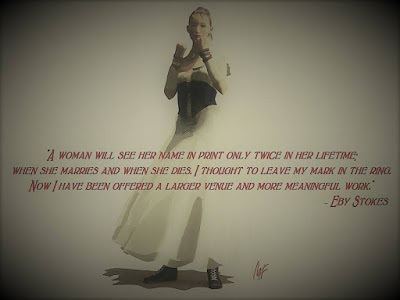 The idea of putting Sherlock Holmes in the boxing ring was a natural for the Fight Card series, but it took some history before Watson would record Holmes’ first time to toe the line. The now fifty book strong Fight Card series was conceived during a late night phone call in late 2011. The wide-ranging conversation between myself and prolific writer Mel Odom had worked around to our shared passion for Robert E. Howard’s two-fisted boxing tales featuring Sailor Steve Costigan. These tough, tight, action-filled stories had been published as 25,000 word novelettes in the pulp magazine Fight Stories during the '30s and '40s.
The idea of putting Sherlock Holmes in the boxing ring was a natural for the Fight Card series, but it took some history before Watson would record Holmes’ first time to toe the line. The now fifty book strong Fight Card series was conceived during a late night phone call in late 2011. The wide-ranging conversation between myself and prolific writer Mel Odom had worked around to our shared passion for Robert E. Howard’s two-fisted boxing tales featuring Sailor Steve Costigan. These tough, tight, action-filled stories had been published as 25,000 word novelettes in the pulp magazine Fight Stories during the '30s and '40s.
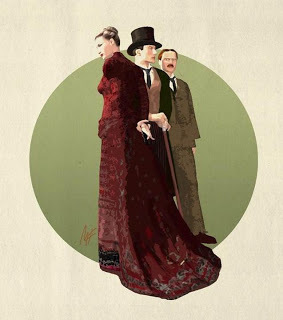 In those years, the fight pulps and other sports specific short story magazines, competed for newsstand space with the likes of The Shadow, Doc Savage, and hundreds of other themed titles ranging from aerial combat to westerns to romance to weird science to superheroes to horror and shudder pulps. Each of these magazines was identified by the garish colors of their lurid covers and the rough paper on which they were printed. In one of those moments of shared inspiration, Mel and I decided to try our hand at a couple of tales similar to the pulp boxing stories we admired. Knowing there was no longer a traditional market for 25,000 word novelettes, we decided we could utilize Amazon’s burgeoning e-book platform to send the novelettes out into the wild.
In those years, the fight pulps and other sports specific short story magazines, competed for newsstand space with the likes of The Shadow, Doc Savage, and hundreds of other themed titles ranging from aerial combat to westerns to romance to weird science to superheroes to horror and shudder pulps. Each of these magazines was identified by the garish colors of their lurid covers and the rough paper on which they were printed. In one of those moments of shared inspiration, Mel and I decided to try our hand at a couple of tales similar to the pulp boxing stories we admired. Knowing there was no longer a traditional market for 25,000 word novelettes, we decided we could utilize Amazon’s burgeoning e-book platform to send the novelettes out into the wild. 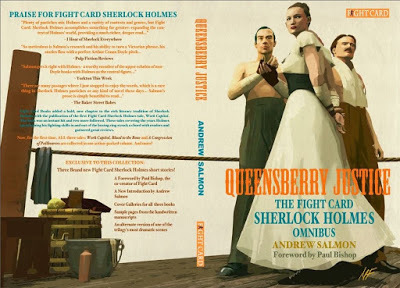 We had a blast writing the first two Fight Card tales—Felony Fistsand Cutman—which were published in January 2012. Then came a surprise—the stories not only resonated with readers, but also with writers. Young lions on the verge of burgeoning writing careers and a few established pros asked if they could take a crack at a Fight Card story. Going with the generated momentum, Mel and I put together some basic guidelines. Fight Card stories would be 25,000 to 30,000 words in length; They could take place anywhere in the world, but needed to be set in the pulp era of the ‘40s and ‘50s; Boxing had to be at the center of each Fight Card story, not just a background. Stories didn’t have to be about the heavy-weight championship of the world (they could be about a battleship title in the Navy, a bar championship in the Bronx, or between two rivals in Peoria, PA, for the love of a girl), but the resolution had to come in the ring. Stories would be rated PG13. With these ideals, emerging noir master Eric Beetner wrote the third Fight Card entry, Split Decision, which he would later follow up with the sequel, A Mouth Full of Blood. Both these stories epitomized the goals of the Fight Card series, setting the standard for all Fight Card books to follow. Eric has since gone on to wide critical acclaim with novels like The Devil Doesn’t Want Me, When The Devil Comes To Call, Rumrunners, and Leadfoot.
We had a blast writing the first two Fight Card tales—Felony Fistsand Cutman—which were published in January 2012. Then came a surprise—the stories not only resonated with readers, but also with writers. Young lions on the verge of burgeoning writing careers and a few established pros asked if they could take a crack at a Fight Card story. Going with the generated momentum, Mel and I put together some basic guidelines. Fight Card stories would be 25,000 to 30,000 words in length; They could take place anywhere in the world, but needed to be set in the pulp era of the ‘40s and ‘50s; Boxing had to be at the center of each Fight Card story, not just a background. Stories didn’t have to be about the heavy-weight championship of the world (they could be about a battleship title in the Navy, a bar championship in the Bronx, or between two rivals in Peoria, PA, for the love of a girl), but the resolution had to come in the ring. Stories would be rated PG13. With these ideals, emerging noir master Eric Beetner wrote the third Fight Card entry, Split Decision, which he would later follow up with the sequel, A Mouth Full of Blood. Both these stories epitomized the goals of the Fight Card series, setting the standard for all Fight Card books to follow. Eric has since gone on to wide critical acclaim with novels like The Devil Doesn’t Want Me, When The Devil Comes To Call, Rumrunners, and Leadfoot.
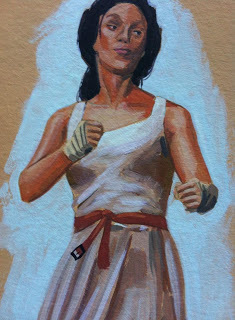 Australian pulpmeister David Foster was the first writer to take Fight Card international. King of the Outback followed the rivalry between travelling boxing shows in the 1950s Australian Outback and the rise of an Aboriginal boxer. Later David would take Fight Card to South Africa in Rumble In The Jungle, then back to Australia with The Fists of Ned Kelley. David also shouldered much of the formatting and cover creation duties for the series. He has also gone on to success under his James Hopwood pseudonym with his Jarvis Love espionage novels (The Librio Defection, The Danakil Deception, The Ambrosia Kill). More good things came Fight Card’s way when the now bestselling Terrence McCauley (Sympathy For The Devil, A Murder of Crows) joined the team. Terrence’s novel, Prohibition, featuring ex-boxer turned organized crime enforcer Terry Quinn, had been published to growing critical buzz. Terrance wanted to write the prequel to Prohibition, which would focus on how Terry Quinn became an ex-boxer. He wanted to write the story as a Fight Card novel, but the time period was the 1920s—outside the established Fight Card era of the ‘40s and ‘50s. Prohibition was a terrific novel and Terrence was clearly headed for bestsellerdom. There was no way an arbitrary guideline was going to stop Fight Card from getting a marquee writer on board. Terrence’s Fight Card entry, Against The Ropes, was terrific. It also opened the vistas for other Fight Card tales.
Australian pulpmeister David Foster was the first writer to take Fight Card international. King of the Outback followed the rivalry between travelling boxing shows in the 1950s Australian Outback and the rise of an Aboriginal boxer. Later David would take Fight Card to South Africa in Rumble In The Jungle, then back to Australia with The Fists of Ned Kelley. David also shouldered much of the formatting and cover creation duties for the series. He has also gone on to success under his James Hopwood pseudonym with his Jarvis Love espionage novels (The Librio Defection, The Danakil Deception, The Ambrosia Kill). More good things came Fight Card’s way when the now bestselling Terrence McCauley (Sympathy For The Devil, A Murder of Crows) joined the team. Terrence’s novel, Prohibition, featuring ex-boxer turned organized crime enforcer Terry Quinn, had been published to growing critical buzz. Terrance wanted to write the prequel to Prohibition, which would focus on how Terry Quinn became an ex-boxer. He wanted to write the story as a Fight Card novel, but the time period was the 1920s—outside the established Fight Card era of the ‘40s and ‘50s. Prohibition was a terrific novel and Terrence was clearly headed for bestsellerdom. There was no way an arbitrary guideline was going to stop Fight Card from getting a marquee writer on board. Terrence’s Fight Card entry, Against The Ropes, was terrific. It also opened the vistas for other Fight Card tales.
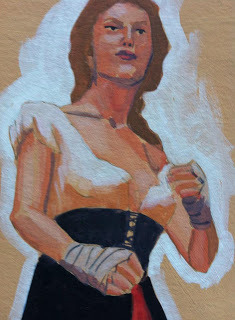 A second Fight Cardbrand, Fight Card MMA, was quickly established. These books featured the same two-fisted Fight Card action, but in the octagon cage instead of the squared circle. Next came Fight Card Now, with contemporary boxing stories. Then Fight Card Luchadors filled with the showmanship, traditions, and action of Mexican masked wrestlers. Even a Fight Card Romance offshoot made an appearance to the acclaim of a whole new audience. It was now a question of where Fight Card would go next... In early 2013, a group of Fight Card authors serendipitously gathered together at the Pulp Ark convention in Arkansas. A discussion of involving historic and iconic figures in the Fight Card compendium led to a light bulb explosion of an idea—Fight Card Sherlock Holmes. A discussion began regarding canonical connected incidents tying Sherlock Holmes to the world of Victorian pugilism—and there were a number—through which Fight Card could logically enter the world of Sherlock Holmes. In The Adventure of the Solitary Cyclist a brawl breaks out when Holmes is sucker-punched with a backhander from a drunken lout named Woodley. Holmes proceeds to wipe the pub floor with Woodley, telling Watson, “The next few minutes were delicious. It was a straight left against a slogging ruffian. I emerged as you see me. Mr. Woodley went home in a cart.” In The Adventure of the Empty House, Holmes makes an off-hand mention regarding a fistic encounter with a man named Mathews, “who knocked out my left canine in the waiting-room at Charing Cross.” In The Sign Of the Four, Holmes reminds ex-prize fighter McMurdo of their first encounter: “I don’t think you can have forgotten me. Don’t you remember the amateur who fought three rounds with you at Alison’s rooms on the night of your benefit four years back?” “Not Mr. Sherlock Holmes!” roared the prize-fighter. “God’s truth! how could I have mistook you? If instead o’ standin’ there so quiet you had just stepped up and given me that cross-hit of yours under the jaw, I’d ha’ known you without a question. Ah, you’re one that has wasted your gifts, you have! You might have aimed high, if you had joined the fancy.” “You see, Watson, if all else fails me, I have still one of the scientific professions open to me,” said Holmes, laughing.
A second Fight Cardbrand, Fight Card MMA, was quickly established. These books featured the same two-fisted Fight Card action, but in the octagon cage instead of the squared circle. Next came Fight Card Now, with contemporary boxing stories. Then Fight Card Luchadors filled with the showmanship, traditions, and action of Mexican masked wrestlers. Even a Fight Card Romance offshoot made an appearance to the acclaim of a whole new audience. It was now a question of where Fight Card would go next... In early 2013, a group of Fight Card authors serendipitously gathered together at the Pulp Ark convention in Arkansas. A discussion of involving historic and iconic figures in the Fight Card compendium led to a light bulb explosion of an idea—Fight Card Sherlock Holmes. A discussion began regarding canonical connected incidents tying Sherlock Holmes to the world of Victorian pugilism—and there were a number—through which Fight Card could logically enter the world of Sherlock Holmes. In The Adventure of the Solitary Cyclist a brawl breaks out when Holmes is sucker-punched with a backhander from a drunken lout named Woodley. Holmes proceeds to wipe the pub floor with Woodley, telling Watson, “The next few minutes were delicious. It was a straight left against a slogging ruffian. I emerged as you see me. Mr. Woodley went home in a cart.” In The Adventure of the Empty House, Holmes makes an off-hand mention regarding a fistic encounter with a man named Mathews, “who knocked out my left canine in the waiting-room at Charing Cross.” In The Sign Of the Four, Holmes reminds ex-prize fighter McMurdo of their first encounter: “I don’t think you can have forgotten me. Don’t you remember the amateur who fought three rounds with you at Alison’s rooms on the night of your benefit four years back?” “Not Mr. Sherlock Holmes!” roared the prize-fighter. “God’s truth! how could I have mistook you? If instead o’ standin’ there so quiet you had just stepped up and given me that cross-hit of yours under the jaw, I’d ha’ known you without a question. Ah, you’re one that has wasted your gifts, you have! You might have aimed high, if you had joined the fancy.” “You see, Watson, if all else fails me, I have still one of the scientific professions open to me,” said Holmes, laughing.
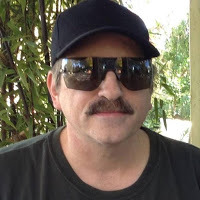 When it came to making Fight Card Sherlock Holmes a reality, there was never a doubt who the author of these special tales should be. Andrew Salmon was an integral part of the New Pulp movement, whose Sherlockian pastiches were among the best being written. Andrew was also familiar with the Fight Card series, having read and reviewed a number of the entries. An email to Andrew outlining the concept of Fight Card Sherlock Holmes led to an excited exchange. He enthusiastically agreed to take on the project. In short order, the game was afoot with Watson guiding Andrew’s furiously typing fingers—Sherlock, with fists raised and a sure knowledge of Baritsu, was squaring up to take on all comers.
When it came to making Fight Card Sherlock Holmes a reality, there was never a doubt who the author of these special tales should be. Andrew Salmon was an integral part of the New Pulp movement, whose Sherlockian pastiches were among the best being written. Andrew was also familiar with the Fight Card series, having read and reviewed a number of the entries. An email to Andrew outlining the concept of Fight Card Sherlock Holmes led to an excited exchange. He enthusiastically agreed to take on the project. In short order, the game was afoot with Watson guiding Andrew’s furiously typing fingers—Sherlock, with fists raised and a sure knowledge of Baritsu, was squaring up to take on all comers.
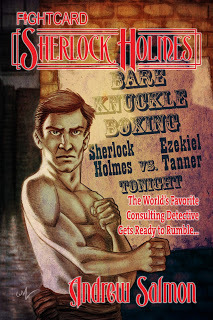 Set in London, England, 1884, the first Fight Card Sherlock Holmes tale, Work Capitol, expands the tale of what happened when Sherlock Holmes stepped into the exhibition ring against retiring prize fighter McMurdo. It also explores the encounter at Charing Cross when Mathews knocked out Holmes’ canine tooth in the waiting-room. Victorian Slang for a crime punishable by death, Work Capitol sees Holmes and Watson chase a diabolical murderer through the dark, illicit, world of Victorian bare-knuckle boxing. To solve the case, Holmes is forced to take a desperate chance by toeing the scratch line opposite London's most dangerous pugilist—Ezekiel Tanner. Published in December 2013, Work Capitol, was an immediate success, garnering critical acclaim from Sherlockians and reviewers alike. Sherlock had the taste of fighting blood in his mouth, and plans began for a second tale of Holmes in the ring. The extensive research done by Andrew for Work Capitol revealed a plethora of pugilistic ideas to get Holmes to toe the line. Andrew’s fingers on the keyboard and Sherlock’s fists began flying and the game was afoot once more.
Set in London, England, 1884, the first Fight Card Sherlock Holmes tale, Work Capitol, expands the tale of what happened when Sherlock Holmes stepped into the exhibition ring against retiring prize fighter McMurdo. It also explores the encounter at Charing Cross when Mathews knocked out Holmes’ canine tooth in the waiting-room. Victorian Slang for a crime punishable by death, Work Capitol sees Holmes and Watson chase a diabolical murderer through the dark, illicit, world of Victorian bare-knuckle boxing. To solve the case, Holmes is forced to take a desperate chance by toeing the scratch line opposite London's most dangerous pugilist—Ezekiel Tanner. Published in December 2013, Work Capitol, was an immediate success, garnering critical acclaim from Sherlockians and reviewers alike. Sherlock had the taste of fighting blood in his mouth, and plans began for a second tale of Holmes in the ring. The extensive research done by Andrew for Work Capitol revealed a plethora of pugilistic ideas to get Holmes to toe the line. Andrew’s fingers on the keyboard and Sherlock’s fists began flying and the game was afoot once more.
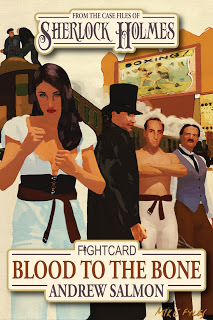 December 2014, saw the publication of Fight Card Sherlock Holmes: Blood To The Bone. Picking up in Deptford, England, in 1888, Holmes is asked to look into the disappearance of Richard Stokes—one half of a carnival tag-team boxing duo. The boxer’s desertion has left his loving wife and pugilistic ring partner, Eby Stokes, homeless and penniless, desperate to know what happened to her spouse. Watson believes the matter to be a common case of abandonment—convinced Holmes' interest is an excuse to fight boredom by trying his hand in the boxing booths of a visiting circus. However, when they are almost killed, the duo trace Stokes’ disappearance to a boxing club disbanded in shame more than sixty years earlier. Determined to find out why Stokes abandoned his wife; what possible significance the long extinct Pugilistic Club could have in the matter; and who was behind the fiery attempt on their lives, Holmes and Watson join forces with Eby Stokes, plunging into a deadly mystery threatening the foundation of the British Empire. This second Sherlockian adventure in Victorian fisticuffs was particularly special. Through Andrew’s creative imagination and writing skills, the amazing Eby Stokes became a woman to rival Irene Adler on every level.
December 2014, saw the publication of Fight Card Sherlock Holmes: Blood To The Bone. Picking up in Deptford, England, in 1888, Holmes is asked to look into the disappearance of Richard Stokes—one half of a carnival tag-team boxing duo. The boxer’s desertion has left his loving wife and pugilistic ring partner, Eby Stokes, homeless and penniless, desperate to know what happened to her spouse. Watson believes the matter to be a common case of abandonment—convinced Holmes' interest is an excuse to fight boredom by trying his hand in the boxing booths of a visiting circus. However, when they are almost killed, the duo trace Stokes’ disappearance to a boxing club disbanded in shame more than sixty years earlier. Determined to find out why Stokes abandoned his wife; what possible significance the long extinct Pugilistic Club could have in the matter; and who was behind the fiery attempt on their lives, Holmes and Watson join forces with Eby Stokes, plunging into a deadly mystery threatening the foundation of the British Empire. This second Sherlockian adventure in Victorian fisticuffs was particularly special. Through Andrew’s creative imagination and writing skills, the amazing Eby Stokes became a woman to rival Irene Adler on every level.
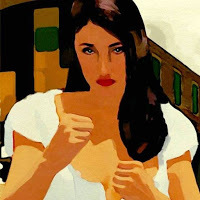 Reading Blood To The Bone, Eby Stokes comes to life as only an inspired character can. There had to be a third Fight Card Sherlock Holmesescapade, if only to bring Eby back for a second round. Furthermore, with the first two pugilistic Holmes tales being successfully published in consecutive Decembers, fans clamored for a third Christmas gift to Sherlockians the following year. Andrew took some time to figure out where Holmes and the fistic arts would again cross paths. There also needed to be some thought given to the next appearance of Eby Stokes—her presence not being taken lightly. Before long, Watson whispered in Andrew’s ear and a new complex tale of skullduggery and fisticuffs began to unfold.
Reading Blood To The Bone, Eby Stokes comes to life as only an inspired character can. There had to be a third Fight Card Sherlock Holmesescapade, if only to bring Eby back for a second round. Furthermore, with the first two pugilistic Holmes tales being successfully published in consecutive Decembers, fans clamored for a third Christmas gift to Sherlockians the following year. Andrew took some time to figure out where Holmes and the fistic arts would again cross paths. There also needed to be some thought given to the next appearance of Eby Stokes—her presence not being taken lightly. Before long, Watson whispered in Andrew’s ear and a new complex tale of skullduggery and fisticuffs began to unfold.
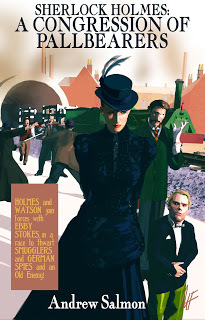 Fight Card Sherlock Holmes: A Congression Of Pallbearers begins in London in October 1894. A pair of cryptic messages lead Holmes and Watson to a destroyed photographer's studio and into an assassination attempt. Their only clue to unravel the mystery is a damaged photograph plate bearing a post-mortem portrait of a dead shipping magnate and his grieving widow. With no time to lose, Holmes and Watson plunge into a boiling cauldron of international intrigue. Joined again by the redoubtable Eby Stokes, they are in for the fight of their lives—a fight where brains must match brawn to turn a deadly tide—with death and destruction threatening to explode from the looming shadows of a war to end all wars. A Congression Of Pallbearers is truly a masterwork from a master of the Holmesian tales. With these three Fight Card Sherlock Holmes novels, Andrew Salmon has both honored and expanded the Sherlockian canon. His work is in the top flight of the Fight Card series alongside stories from some of the brightest authors writing today. Will Sherlock return to the ring? Will Eby Stokes continue to serve Queen and Country? Will Watson channel another two-fisted conundrum through Andrew’s keyboard? The answers to these mysteries are waiting to unfold. Until then, toe the scratch line with this omnibus edition of Fight Card Sherlock Holmes novels and remember to keep punching and never drop your guard...
Fight Card Sherlock Holmes: A Congression Of Pallbearers begins in London in October 1894. A pair of cryptic messages lead Holmes and Watson to a destroyed photographer's studio and into an assassination attempt. Their only clue to unravel the mystery is a damaged photograph plate bearing a post-mortem portrait of a dead shipping magnate and his grieving widow. With no time to lose, Holmes and Watson plunge into a boiling cauldron of international intrigue. Joined again by the redoubtable Eby Stokes, they are in for the fight of their lives—a fight where brains must match brawn to turn a deadly tide—with death and destruction threatening to explode from the looming shadows of a war to end all wars. A Congression Of Pallbearers is truly a masterwork from a master of the Holmesian tales. With these three Fight Card Sherlock Holmes novels, Andrew Salmon has both honored and expanded the Sherlockian canon. His work is in the top flight of the Fight Card series alongside stories from some of the brightest authors writing today. Will Sherlock return to the ring? Will Eby Stokes continue to serve Queen and Country? Will Watson channel another two-fisted conundrum through Andrew’s keyboard? The answers to these mysteries are waiting to unfold. Until then, toe the scratch line with this omnibus edition of Fight Card Sherlock Holmes novels and remember to keep punching and never drop your guard...
Published on May 05, 2017 10:37
ALL THE GOOD BOOKS—PART TWO
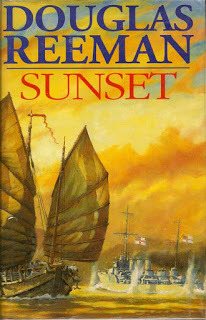
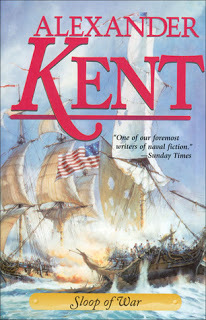 ALL THE GOOD BOOKS—PART TWO In All The Good Books—Part One, I spoke about my eighty-six year old friend Mary’s assertion: You can’t possibly read all the good books—no matter how long you live... As proof of this truth, I wrote about the joys of unexpectedly perceiving a book, a series, or an overlooked author through a different and intriguing prism—opening up a whole new realm of obsessive reading. I also mentioned the companion experience of discovering an author whose books serendipitously enter your orbit with all the subtly of a hurtling giant asteroid. You tentatively try one title and are immediately captivated by a new world and delight in knowing the author has a huge backlist of books waiting for you to explore.
ALL THE GOOD BOOKS—PART TWO In All The Good Books—Part One, I spoke about my eighty-six year old friend Mary’s assertion: You can’t possibly read all the good books—no matter how long you live... As proof of this truth, I wrote about the joys of unexpectedly perceiving a book, a series, or an overlooked author through a different and intriguing prism—opening up a whole new realm of obsessive reading. I also mentioned the companion experience of discovering an author whose books serendipitously enter your orbit with all the subtly of a hurtling giant asteroid. You tentatively try one title and are immediately captivated by a new world and delight in knowing the author has a huge backlist of books waiting for you to explore.
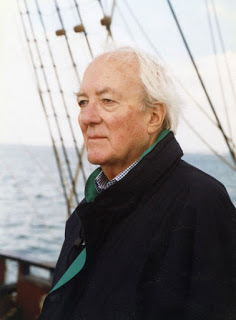 It is rare for this second phenomena to happen to me, but earlier this year I came across the obituary for Douglas Reeman, who passed away on January 23rd. I was aware of Reeman’s highly successful Richard Bilotho series of swashbuckling Royal Navy adventures—written under the pseudonym Alexander Kent—set during the Napoleonic wars. However, in my understanding, these were Horatio Hornblower clones comparable to Patrick O’Brian’s popular Aubrey and Maturin series from the same genre.
It is rare for this second phenomena to happen to me, but earlier this year I came across the obituary for Douglas Reeman, who passed away on January 23rd. I was aware of Reeman’s highly successful Richard Bilotho series of swashbuckling Royal Navy adventures—written under the pseudonym Alexander Kent—set during the Napoleonic wars. However, in my understanding, these were Horatio Hornblower clones comparable to Patrick O’Brian’s popular Aubrey and Maturin series from the same genre.
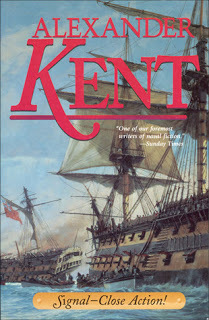 I’d read the Hornblower series in my twenties as well as the men’s adventure paperback original equivalent featuring the meanest bastard to ever sail a Royal command, George Abercrombie Fox (written by the prolific Kenneth Bulmer under his Adam Hardy pseudonym). While Hornblower verges on being classified as literature, the Fox series is as lowbrow as it gets by comparison. Still, I believed I’d read the best and worst of the genre (possibly enjoying the worst more than the best), seen Master And Commander on the big screen (based on a Patrick O’Brian book), and had never been intrigued to dip further into the genre. As a result, Reeman/Kent dropped off my radar.
I’d read the Hornblower series in my twenties as well as the men’s adventure paperback original equivalent featuring the meanest bastard to ever sail a Royal command, George Abercrombie Fox (written by the prolific Kenneth Bulmer under his Adam Hardy pseudonym). While Hornblower verges on being classified as literature, the Fox series is as lowbrow as it gets by comparison. Still, I believed I’d read the best and worst of the genre (possibly enjoying the worst more than the best), seen Master And Commander on the big screen (based on a Patrick O’Brian book), and had never been intrigued to dip further into the genre. As a result, Reeman/Kent dropped off my radar.
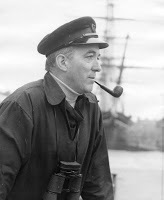 I was vaguely aware Reeman was prolific under his own name, writing three dozen WWII naval action novels. This was another genre I’d studiously avoided as too huge to tackle beyond Alistair MacLean’s The Guns of Navarone and Where Eagles Dare. I couldn’t have named a Reeman WWII title on a bet. In the real world, my career demands I work hard to be non-judgmental and seek understanding of different cultures. Apparently, this trait did not translated successfully to my reading habits—I am sometimes astonished to be confronted by my literary prejudices and my closeminded approach to particular genres.
I was vaguely aware Reeman was prolific under his own name, writing three dozen WWII naval action novels. This was another genre I’d studiously avoided as too huge to tackle beyond Alistair MacLean’s The Guns of Navarone and Where Eagles Dare. I couldn’t have named a Reeman WWII title on a bet. In the real world, my career demands I work hard to be non-judgmental and seek understanding of different cultures. Apparently, this trait did not translated successfully to my reading habits—I am sometimes astonished to be confronted by my literary prejudices and my closeminded approach to particular genres.
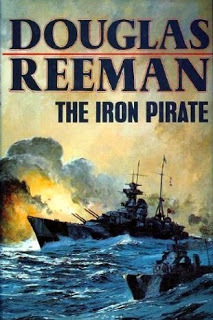 This character flaw is usually brought to my attention by a precipitating event or previously unknown fact. In the case of Reeman, it was a line in his obituary stating he had once been a detective in the London Metropolitan Police force. To be a detective in the Met, an officer would need to have some tenure and make his way up through the ranks from uniformed constable. So, it was reasonable to assume Reeman had spent some time on the job and was another in a long line of cops turned writers—as I am myself. This note of kinship led me to give his WWII novels a try. I started with Sunset, attracted to the novel by the beautiful paperback cover. Set in 1941, Commander Esmond Brooke and the HMS Serpent are send to Hong Kong, which is on the verge of a Japanese invasion the British admiralty unequivocally states will never happen. What follows is an engrossing character study of a leader attempting to protect his men, his ship, and the citizens of Hong Kong from the ignorant superiority of those in charge interested only in protocol and displays of dress whites on deck.
This character flaw is usually brought to my attention by a precipitating event or previously unknown fact. In the case of Reeman, it was a line in his obituary stating he had once been a detective in the London Metropolitan Police force. To be a detective in the Met, an officer would need to have some tenure and make his way up through the ranks from uniformed constable. So, it was reasonable to assume Reeman had spent some time on the job and was another in a long line of cops turned writers—as I am myself. This note of kinship led me to give his WWII novels a try. I started with Sunset, attracted to the novel by the beautiful paperback cover. Set in 1941, Commander Esmond Brooke and the HMS Serpent are send to Hong Kong, which is on the verge of a Japanese invasion the British admiralty unequivocally states will never happen. What follows is an engrossing character study of a leader attempting to protect his men, his ship, and the citizens of Hong Kong from the ignorant superiority of those in charge interested only in protocol and displays of dress whites on deck.
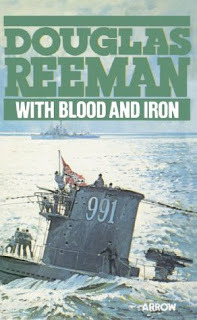 When I turned the last page of Sunset, I immediately began reading another Reeman novel, Dive In The Sun—the story of a British miniature submarine crew in a duel under the Atlantic and their desperate attempt to escape after destroying a key German harbor base. Sunset had enjoyably held my interest, but Dive In The Sun riveted me. This was a return to my beloved High Adventure genre—ordinary men showing extraordinary courage while battling both nature and a deadly enemy under extraordinary circumstances. Over the next few weeks, my stock of Amazon gift cards was mightily depleted as I ordered paperback copies of Reeman’s numerous books in VG condition. I made the decision to go with paper as opposed to e-books since the covers of Reeman’s books are outstanding and part of the pleasure of reading them.
When I turned the last page of Sunset, I immediately began reading another Reeman novel, Dive In The Sun—the story of a British miniature submarine crew in a duel under the Atlantic and their desperate attempt to escape after destroying a key German harbor base. Sunset had enjoyably held my interest, but Dive In The Sun riveted me. This was a return to my beloved High Adventure genre—ordinary men showing extraordinary courage while battling both nature and a deadly enemy under extraordinary circumstances. Over the next few weeks, my stock of Amazon gift cards was mightily depleted as I ordered paperback copies of Reeman’s numerous books in VG condition. I made the decision to go with paper as opposed to e-books since the covers of Reeman’s books are outstanding and part of the pleasure of reading them.
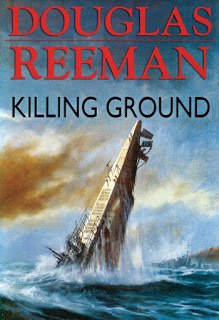 Reeman's debut novel, A Prayer for the Ship, was published in 1958. In 1959, he followed up his debut with High Water, a straightforward contemporary sea going adventure novel. As he explains in the introduction to my edition, he was still learning his craft as a writer and had not yet discovered the strengths that would lead him to the backgrounds and themes of his later books. Reeman’s books break down into four main groups: 26 WWII naval warfare novels (everything from submarines to destroyers to torpedo boats to anything that floats or submerges); 6 standalone action novels from time periods other than WWII; 5 novels in his Blackwood generational saga played out against the history of the Royal Marines; and 30 books under his Alexander Kent pseudonym featuring the chronicles of Richard Bolitho (and later Bolitho’s nephew Adam) battling in Her Majesty’s ships on the High Seas during the Napoleonic wars—a total of 67 books to keep me deep in pages for the foreseeable future and maybe beyond.
Reeman's debut novel, A Prayer for the Ship, was published in 1958. In 1959, he followed up his debut with High Water, a straightforward contemporary sea going adventure novel. As he explains in the introduction to my edition, he was still learning his craft as a writer and had not yet discovered the strengths that would lead him to the backgrounds and themes of his later books. Reeman’s books break down into four main groups: 26 WWII naval warfare novels (everything from submarines to destroyers to torpedo boats to anything that floats or submerges); 6 standalone action novels from time periods other than WWII; 5 novels in his Blackwood generational saga played out against the history of the Royal Marines; and 30 books under his Alexander Kent pseudonym featuring the chronicles of Richard Bolitho (and later Bolitho’s nephew Adam) battling in Her Majesty’s ships on the High Seas during the Napoleonic wars—a total of 67 books to keep me deep in pages for the foreseeable future and maybe beyond.
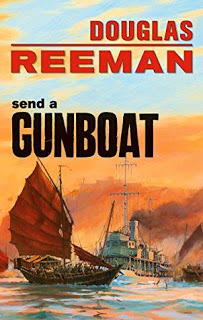 I’ve now read five of Reeman’s WWII books, a couple of his standalones, and the first of his Blackwood saga, and I’ve yet to be disappointed. Each easily passed my twenty-five page test (if I’m not engaged in a book by page twenty-five, it’s tossed in a pile to take to the Friends of the Library) and even my original fifty page test. Last week, it was time to crack open the first of the Richard Bolitho books, Richard Bolitho, Midshipman, from 1975, written under the Alexander Kent pseudonym, which Reeman chose as homage to a friend and naval officer who died during the Second World War.
I’ve now read five of Reeman’s WWII books, a couple of his standalones, and the first of his Blackwood saga, and I’ve yet to be disappointed. Each easily passed my twenty-five page test (if I’m not engaged in a book by page twenty-five, it’s tossed in a pile to take to the Friends of the Library) and even my original fifty page test. Last week, it was time to crack open the first of the Richard Bolitho books, Richard Bolitho, Midshipman, from 1975, written under the Alexander Kent pseudonym, which Reeman chose as homage to a friend and naval officer who died during the Second World War.
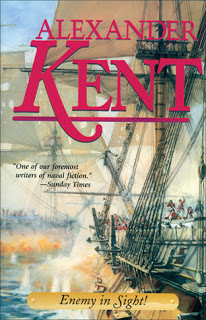 I purposely left the Bolitho series to sample last, still reluctant to return to Her Majesty’s wooden fighting ships, with which I had last sailed under the command of Captain Horatio Hornblower—and a second tour under the lash of the rapacious, court martial dodging, George Abercrombie Fox. My reluctance was, however, unfounded. Seven days later, I have exuberantly battled beside Bolitho through the first four books in the series and stand ready to fight beside him again and again. The Bolitho books not only display the same depth of character and moral quandaries I was captivated by in Reeman’s other works, but there is an additional layer of affection on display in this series. They are clearly Reeman’s favorite children. This is not to disparage his other novels in any way, but his books written as Alexander Kent have something a little extra.
I purposely left the Bolitho series to sample last, still reluctant to return to Her Majesty’s wooden fighting ships, with which I had last sailed under the command of Captain Horatio Hornblower—and a second tour under the lash of the rapacious, court martial dodging, George Abercrombie Fox. My reluctance was, however, unfounded. Seven days later, I have exuberantly battled beside Bolitho through the first four books in the series and stand ready to fight beside him again and again. The Bolitho books not only display the same depth of character and moral quandaries I was captivated by in Reeman’s other works, but there is an additional layer of affection on display in this series. They are clearly Reeman’s favorite children. This is not to disparage his other novels in any way, but his books written as Alexander Kent have something a little extra.
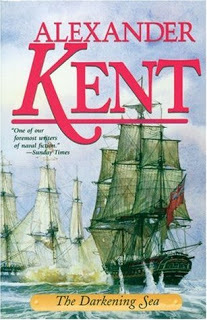 From Bolitho’s prospective, the series takes the reader through the history of Nelson's Navy—from before the American War of Independence to after the end of the Napoleonic Wars. This is a true saga, but these are not tomes filled with dry facts and irritating minutia, there is action, emotion, and color on every page. Sorry, Horatio, but Bolitho could sail circles around you. There you have it, more proof you can never read all the good books. When you are staring at your bookshelves and not a single title is jumping out at you to pick up and read, do not despair. Somewhere, waiting to be revealed to you at the most unexpected moment, is another author, another character, another series, another reading experience to again thrill you with the joy of turning pages. To find out more about Reeman and his novels on the excellent website curated by his wife CLICK HERE DOUGLAS REEMAN CHECKLIST WWII NOVELS A Prayer for the Ship Dive in the Sun The Hostile Shore With Blood and Iron HMS Saracen The Pride and the Anguish To Risks Unknown Rendezvous—South Atlantic The Destroyers His Majesty's U-Boat(aka: Go in and Sink) Winged Escort Surface with Daring Strike from the Sea A Ship Must Die Torpedo Run The Volunteers The Iron Pirate In Danger's Hour The White Guns Killing Ground Sunset A Dawn Like Thunder Battlecruiser For Valour The Glory Boys Twelve Seconds to Live STANDALONES High Water Send a Gunboat The Last Raider The Greatest Enemy Path of the Storm The Deep Silence THE BLACKWOOD/ROYAL MARINES SAGABadge of Glory The First to Land The Horizon Dust on the Sea Knife Edge RICHARD BOLITHO SAGA/ALEXANDER KENT Bolitho, Midshipman Bolitho and the Avenger Band of Brothers Stand into Danger In Gallant Company Sloop of War To Glory We Steer Command a King's Ship Passage To Mutiny With All Dispatch Form Line of Battle Enemy in Sight Flag Captain Signal—Close Action The Inshore Squadron A Tradition of Victory Success to the Brave Colours Aloft Honour This Day The Only Victor Beyond The Reef The Darkening Sea My Country's Freedom Cross of St. George Sword of Honour Second to None Relentless Pursuit Man of War Heart of Oak In the King's Name
From Bolitho’s prospective, the series takes the reader through the history of Nelson's Navy—from before the American War of Independence to after the end of the Napoleonic Wars. This is a true saga, but these are not tomes filled with dry facts and irritating minutia, there is action, emotion, and color on every page. Sorry, Horatio, but Bolitho could sail circles around you. There you have it, more proof you can never read all the good books. When you are staring at your bookshelves and not a single title is jumping out at you to pick up and read, do not despair. Somewhere, waiting to be revealed to you at the most unexpected moment, is another author, another character, another series, another reading experience to again thrill you with the joy of turning pages. To find out more about Reeman and his novels on the excellent website curated by his wife CLICK HERE DOUGLAS REEMAN CHECKLIST WWII NOVELS A Prayer for the Ship Dive in the Sun The Hostile Shore With Blood and Iron HMS Saracen The Pride and the Anguish To Risks Unknown Rendezvous—South Atlantic The Destroyers His Majesty's U-Boat(aka: Go in and Sink) Winged Escort Surface with Daring Strike from the Sea A Ship Must Die Torpedo Run The Volunteers The Iron Pirate In Danger's Hour The White Guns Killing Ground Sunset A Dawn Like Thunder Battlecruiser For Valour The Glory Boys Twelve Seconds to Live STANDALONES High Water Send a Gunboat The Last Raider The Greatest Enemy Path of the Storm The Deep Silence THE BLACKWOOD/ROYAL MARINES SAGABadge of Glory The First to Land The Horizon Dust on the Sea Knife Edge RICHARD BOLITHO SAGA/ALEXANDER KENT Bolitho, Midshipman Bolitho and the Avenger Band of Brothers Stand into Danger In Gallant Company Sloop of War To Glory We Steer Command a King's Ship Passage To Mutiny With All Dispatch Form Line of Battle Enemy in Sight Flag Captain Signal—Close Action The Inshore Squadron A Tradition of Victory Success to the Brave Colours Aloft Honour This Day The Only Victor Beyond The Reef The Darkening Sea My Country's Freedom Cross of St. George Sword of Honour Second to None Relentless Pursuit Man of War Heart of Oak In the King's Name
Published on May 05, 2017 09:18

